China Arts & Entertainment
25 ‘Tainted Celebrities’: What Happens When Chinese Entertainers Get Canceled?
What happens after Chinese celebrities become tainted by scandal? A list of 25 ‘tainted celebrities’ in China.
Published
4 years agoon
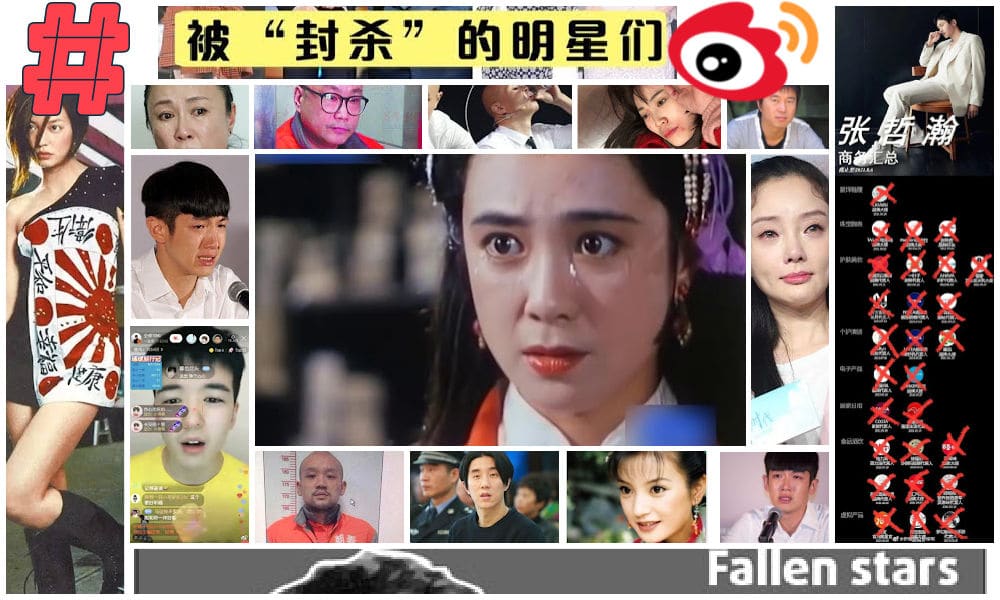
PREMIUM CONTENT ARTICLE
What happens when Chinese celebrities get tainted by scandal? This is a list of 25 notable Chinese celebrities who got caught up in controversy. What did they do, and where are they now? An overview by What’s on Weibo.
This year seems to be a peak year to see China’s entertainment stars falling from the sky. After various celebrity scandals occurred earlier in 2021, a major ‘entertainment circles earthquake’ took place in late August.
Famous actresses Zhao Wei (赵薇) and Zheng Shuang (郑爽), along with Chinese music producer and TV host Gao Xiaosong (高晓松), saw their names and work wiped from various online channels. Online fan groups and ‘super topics’ dedicated to these celebrities, as well as others, were taken offline.
China’s entertainment circles have not seen so many scandals and investigations since 2014, when there were so many Chinese celebrities in prison that netizens spoofed the famous 1987 action movie Prison on Fire (监狱风云) and jokingly made it feature imprisoned stars with the main lead for actor Huang Haibo (黄海波).
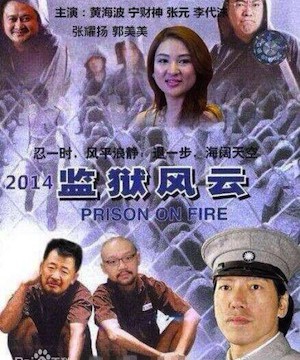
A 2014 meme featuring Chinese celebrities in prison.
The recent blow to Chinese entertainment culture is partly related to a larger “clean up” campaign (清朗专项行动) targeting celebrities and online fan communities.
Many Chinese celebrities from the entertainment industry were ‘canceled’ over the past years over their illegal behavior and activities. But not all celebrity scandals are related to top-down measures; sometimes there are those whose reputation becomes irreversibly damaged over cheating, sex scandals, inappropriate (leaked) online messages, or by them getting caught up in controversial and sensitive historical or political issues.
Sometimes the ‘trial’ is by the public, other times it’s by authorities, but it always ends up being a trial by media.
We have compiled a top 25 list of Chinese celebrities in the show business who suffered a public fall from grace with updates on where they are now, perhaps giving an idea of what the future might look like for those Chinese stars who have recently been ‘blacklisted.’
This list only includes those celebrities whose scandals played out online in the age of social media. It is a top 25 of ‘tainted celebrities’ within mainland China’s entertainment industry, listed in chronological order of when their reputation suffered a blow.
#1 Edison Chen 陈冠希
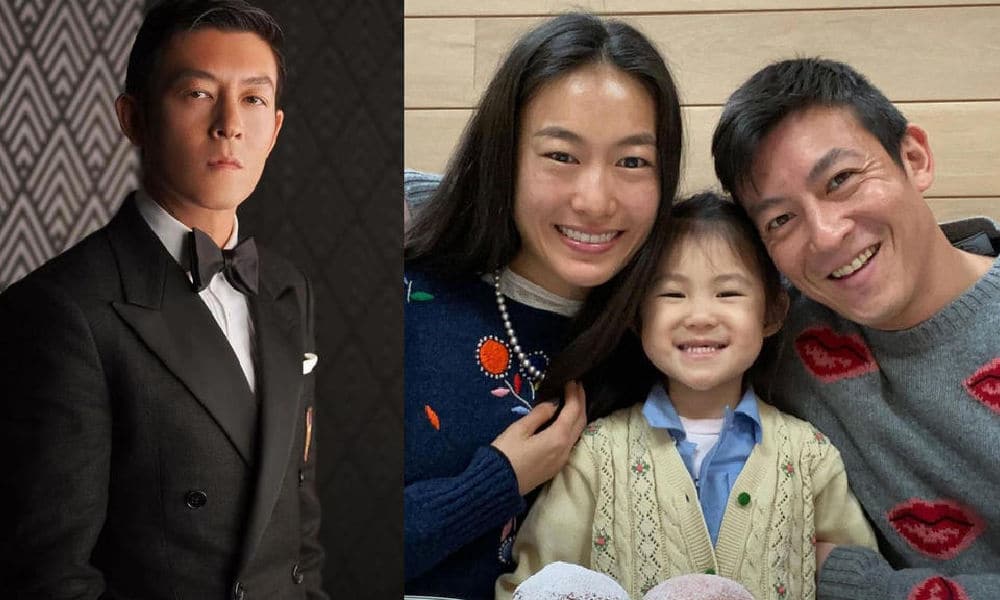
Edison Chen is a Canadian-born Hong Kong actor, singer, and entrepreneur whose 2008 sex photo scandal (“艳照门”) shook Chinese entertainment circles. Although this scandal mostly relates to the Hong Kong entertainment industry, we’ve still added it to this list since it is also widely known in mainland China.
The scandal erupted when intimate and private photos started circulating on the internet, showing the actor with various women, including actresses Gillian Chung, Bobo Chan, Rachel Ngan, and Cecilia Cheung. The photos were, among others, disseminated on the Chinese internet forum Tianya, where they received over twenty million views.
The photos were stolen from Chen’s computer and illegally uploaded online. Over eight people were arrested in relation to this case (see wiki page here). In February of 2008, Chen announced that he would step away from the Hong Kong entertainment industry.
Where is he now?
By now, Edison Chen has become a family man. In 2017, he married Chinese supermodel Qin Shupei and they have a kid together.
Chen is a brand ambassador for Ralph Lauren, and together with his family he also participated in the brand’s “Family is who you love” campaign.
Chen has been successful in business – he is the founder of the streetwear label CLOT. He also has a large following on Weibo of over 29,5 million fans (@edc陳冠希).
Nevertheless, the actor can’t seem to shake off scandal. In June of 2021, he was caught in scandal again when older posts of a Chinese woman surfaced on Weibo in which she accused the actor of trying to seduce her twice between November 2016 and January 2017.
#2 Man Wenjun 满文军
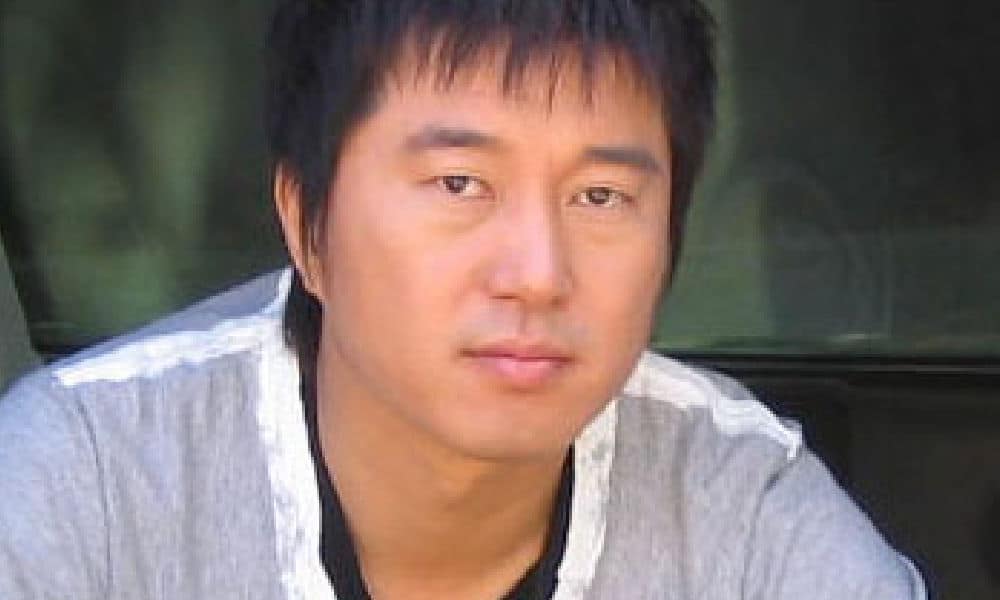
The drugs scandal involving famous pop star Man Wenjun (满文军, 1969) became major news in China in May of 2009 when the celebrity was busted with heroin during a raid in the Beijing Coco Banana nightclub, where he was celebrating his wife’s 40th birthday in a VIP room.
Ma is most famous for songs such as I Understand You (懂你) and Longing for My Hometown (望乡). He was also one of the singers who sang the theme song Beijing Welcomes You (北京欢迎你) for the 2008 Olympics.
The singer and his wife were detained, along with more than ten other people who all tested positive for drug use. At the time, China.org reported that an unnamed drug dealer told media that the celebrity couple were frequent drug users and bought 2.5 grams of heroin from him.
Man eventually only served twenty days in prison. His wife, however, got a much longer sentence. Li Li (李俐) – Man’s second wife after a previous divorce – later confessed to giving ecstasy tablets to two people that evening. She received a one-year prison sentence and a 2,000 yuan penalty.
The singer was criticized for testifying against his own wife. When she heard her husband’s testimony against her (alleging that she was the one doing drugs), she allegedly called her husband ‘inhumane.’
The incident sparked online discussion about the moral standards of celebrities, and China.org published a list of celebrities who previously also got caught up in drug-related scandals.
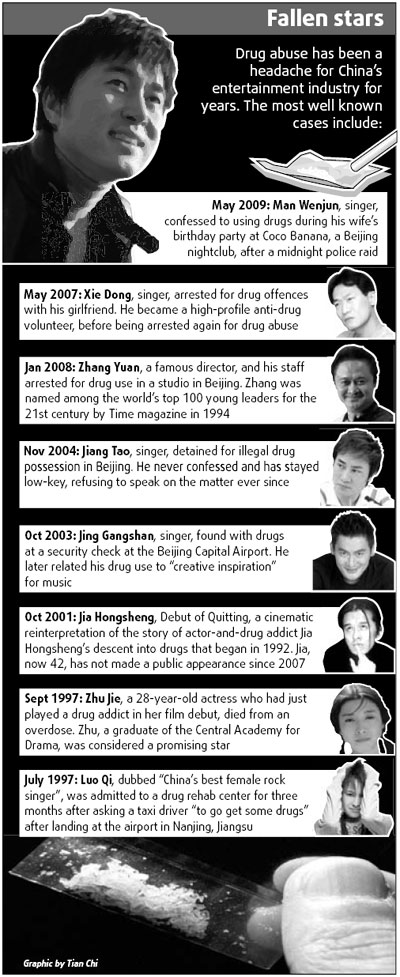
Man’s arrest would just be the beginning of an even longer list of celebrities getting caught with drugs in the years after.
Where is he now?
Unsurprisingly, Man Wenjun and Li Li are now divorced.
The drugs scandal meant a major blow to Man’s reputation, and despite still releasing new music and occasional performances, he would never again regain the success he once had. It is rumored that Man now runs his own music training institution, where he is a music teacher.
#3 Li Daimo 李代沫

Li Daimo (李代沫, 1988), is a Chinese singer who rose to fame in 2012 during the first season of The Voice of China (中国好声音).
In July 2013, Li came out as being gay. Many netizens applauded Li for coming out, and he gained overwhelming support from fans and followers.
In March of 2014, however, Li’s reputation suffered when he was arrested by Beijing police due to drug possession. Li was found guilty and was sentenced to a fine and nine months in prison.
Where is he now?
After spending seven months behind bars, Li was released from prison in December of 2014. His early release was because of good behavior.
After being released from prison, Li resumed his music career. In 2015, he launched a single titled “Thank You” (谢谢你). Li is still active on Weibo (@李代沫Demon), where he has over a million followers.
Although Li’s tainted past is still often mentioned on Weibo, he is one of the few artists who seems to have made some sort of a comeback to the entertainment industry after such a major controversy, although he will probably never go back to the success he once had. During some live streams Li has done, the singer is often scolded by netizens.
#4 Huang Haibo 黄海波
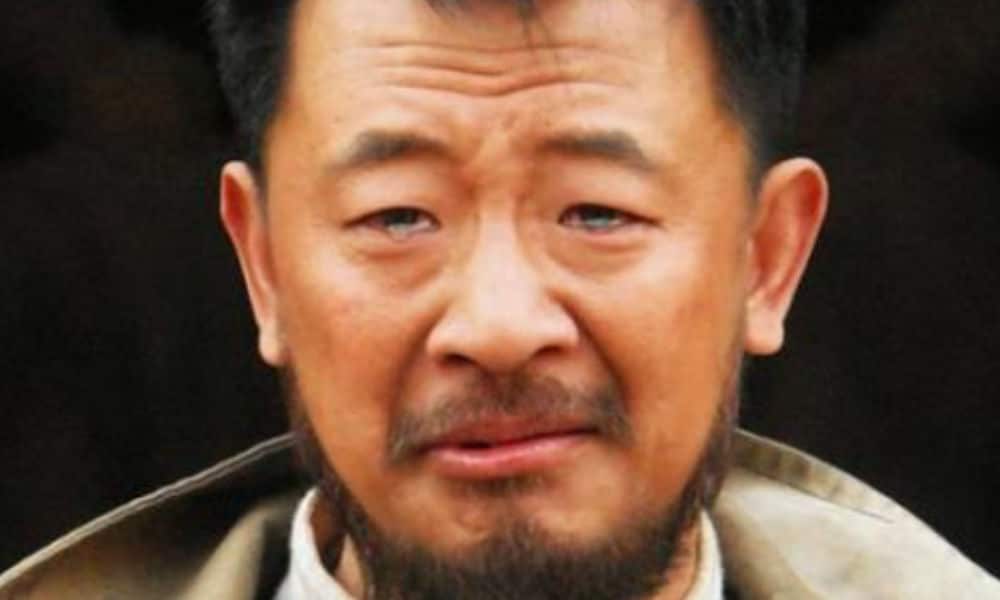
Huang Haibo (黄海波, 1976) is a renowned award-winning Chinese actor who suffered a public fall from grace in 2014 when he was caught soliciting a prostitute in a Beijing hotel. The then-39-year-old was previously known as China’s national “son-in-law” for often playing the nice guy and ideal husband in Chinese productions.
In May of 2014, Beijing Municipal Public Security Bureau announced that Huang was arrested on suspicion of hiring prostitutes, and then he was sentenced to 15 days in prison, followed by a six months sentence of “custody and reeducation.”
After the scandal made headlines, Huang was no longer offered new roles and his TV and film career in mainland China came to an abrupt end.
Although Huang definitely was shut out from the entertainment industry due to this affair, he was not necessarily ‘canceled’ by the public. Many people sided with him since they felt he was trapped or even purposely framed – someone must have tipped off the police in order for them to catch him in the act at the Beijing hotel.
Where is he now?
In 2015, just a year after the scandal made headlines, Huang announced he and his partner were expecting a baby. The actor has since moved to the United States.
His partner is Chinese actress Qu Shanshan (曲栅栅), who is still working.
Huang still has over six million followers on his Weibo account. He has not appeared in any Chinese productions since his scandal.
#5 Zhang Mo 张默
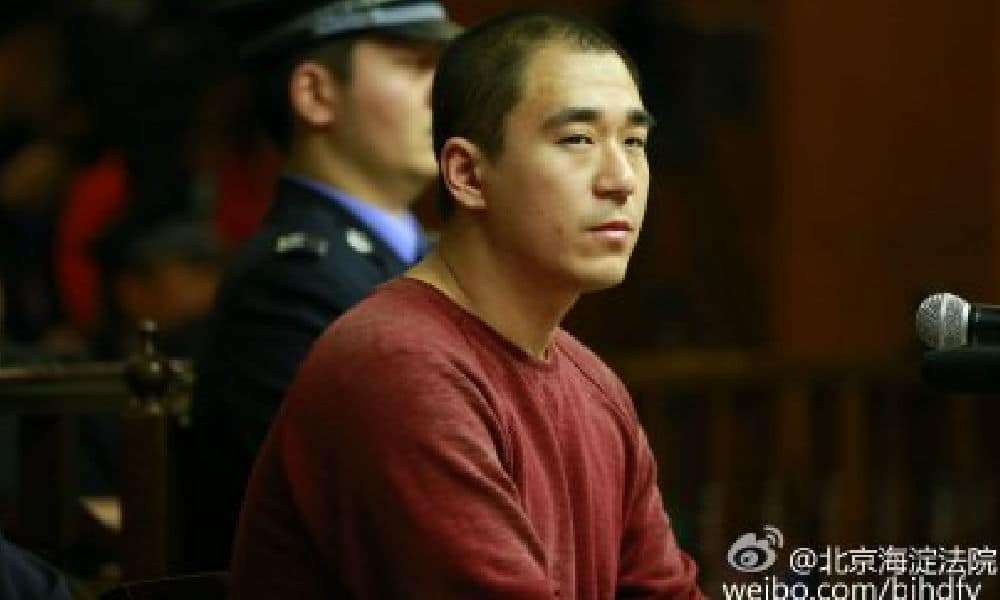
Zhang Mo (张默, 1982) was a famous actor in Chinese TV dramas and films who is especially well-known for his leading role in Let the Bullets Fly. He is also the son of famous actor and producer Zhang Guoli (张国立).
In July of 2014, the actor was arrested in Beijing for illegal drug use. He was sentenced to six months in prison and was fined 5,000 yuan ($800) for drug use and providing others with a venue for drug use. The scandal went viral on Chinese social media, with many feeling sorry for father Zhang Guoli having to deal with such a troubled son.
It was not the first time for the actor to be caught up in controversy, and he became known as a rebel. He was involved in another drug-related incident in 2012. Years before, his ex-girlfriend Tong Yao accused Zhang Mo of assaulting her.
Where is he now?
Since his past controversies, Zhang Mo has moved on to work behind the screens. Zhang was photographed on a set together with his father Zhang Guoli in March of 2021.
It is reported that besides working behind the scenes (he allegedly is a senior executive), Zhang Mo is also a major shareholder of at least two film and television companies.
#6 Kai Ko / Ke Zhendong 柯震东

Although the actor and singer Ko Chentung (柯震东 Ke Zhendong, 1991) – also known as ‘Kai Ko’ – is from Taiwan, he was also very popular in mainland China, which is also where his career-changing scandal took place.
The actor and singer was arrested for possession of drugs in Beijing on August 14 of 2014 together with Jaycee Chan, who is also on this list. Shortly after his arrest, Kai Ko’s manager confirmed the actor would be released on August 28th after a detainment of 14 days. He also stated that Kai Ko felt “very ashamed” of himself.
Although the actor was denounced on social media, there were also many fans who showed their support and even some who vowed to use drugs in support of Ko if he would disappear from the entertainment industry.
The arrest of Ko Chentung over drugs abuse was especially controversial because Ko previously appeared in an anti-drug advertisement in 2012, in which he clearly stated: “I don’t do drugs!”
Where is he now?
After his detainment, Ko delivered a tearful apology on state broadcaster CCTV before returning to Taiwan. The actor was cut from two movies and brand partnerships and upcoming show engagements were all canceled.
Although Ko has barely done any large projects as an actor or singer over the past eight years, he returned to the big screen in 2021 in the film Moneyboys.
#7 Fang Zuming (Jaycee Chan) 房祖名
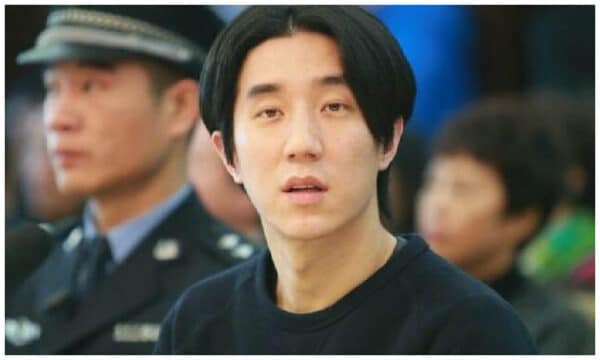
Actor and singer Jaycee Chan (房祖名, 1982), the son of the super famous Jackie Chan, was among several people who were arrested during an August 2014 drug bust at his apartment in Beijing.
Investigators found 100 grams of marijuana in his home, and the actor also tested positive for marijuana use. He was sentenced to six months in prison for the possession and distribution of marijuana, and for accommodating drug users at his home.
Before his arrest, Jaycee worked on the film Monk Comes Down the Mountain (道士下山), but his role was not credited due to the drugs scandal. He was also dropped by the brand he previously worked with, including Adidas, Nivea, KFC, and Chevrolet.
Jaycee’s drug use and prison sentence were already bad enough, but what made matters worse is that his father Jackie was previously appointed as goodwill Ambassador for the China National Anti-Drug Committee.
Where is he now?
Although Jaycee hinted at a comeback to China’s entertainment industry in a public speech he gave after his release from prison, he has never been able to get back the success he had before his arrest. He is now mostly working behind the scenes, and has also become a producer.
With a dad like Jackie Chan, Jaycee hardly has to worry about his financial situation though. Earlier this year, the fallen celebrity was spotted smoking cigars and driving a Mercedes Benz car.
Although he has a Weibo account with 7,4 million followers, Jaycee’s account page is empty.
#8 Yin Xiangjie 尹相杰
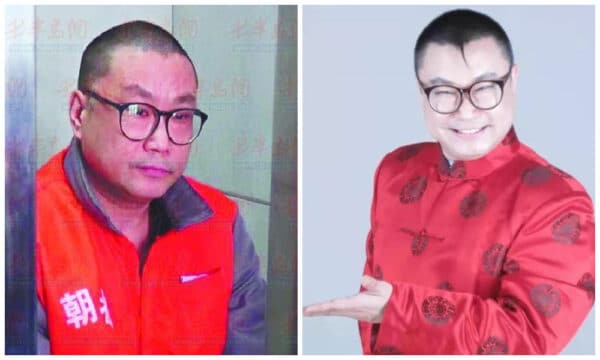
Yin Xiangjie (尹相杰, 1969) is a Chinese singer, host, and actor, who rose to fame after his performance at the Beijing TV Lantern Festival in 1994. He became very popular afterward and was a regular guest at the Spring Festival Gala.
In December of 2015, the singer was arrested at his home for possessing and consuming illegal drugs. Authorities found over 10 grams of drugs at his residence, including crystal methamphetamine. Yin Xiangjie was sentenced to seven months in prison.
With China having a zero-tolerance attitude to drugs, any drug-related scandal would already be a major blow to the reputation of Chinese celebrities. In the case of Yin, the scandal had an ever deeper effect because the singer was previously appointed as an ambassador in an anti-drug campaign of 2007.
Where is he now?
Yin’s first arrest, unfortunately, was not his last. The singer was arrested again in November of 2015, also in relation to drugs, just shortly after he was released from prison.
According to the latest reports, Yun still appears in some obscure advertisements in order to generate an income. But Yin’s once so successful career in China’s entertainment industry seems to be definitely over.
#9 Le Jia (Tim Le) 乐嘉
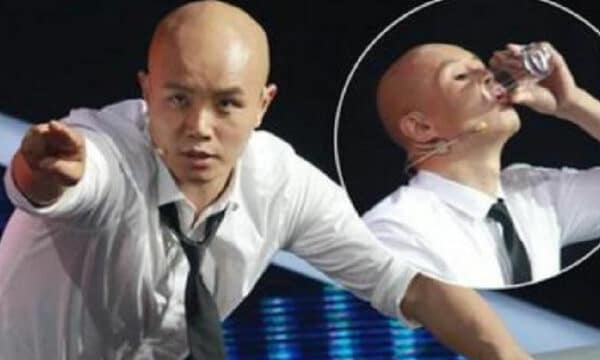
Le Jia (乐嘉, 1975) is a Chinese psychology expert and a published author, who became a famous TV host and entertainer in mainland China, especially after he started participating in the popular TV dating show If You Are The One (非诚勿扰) in 2010.
Le Jia is the founder of the Four-colors Personality Analysis (FPA) and the China Personality Colors Research Center, labeling himself as the first person in China to use colors to identify personality types – a topic about which he published multiple best-selling books.
Le’s 2015 participation in the TV show Super Speaker (超级演说家) caused controversy when Le drank baijiu (liquor) during the recording on stage and then got wildly drunk, causing him to act improperly and scold the other hosts on the show (videos of the show are still lingering online). Guests of the show left the stage, and the recording was halted.
The incident was a major blow to Le Jia’s reputation and his TV career came to an abrupt stop.
Where is he now?
Because Le Jia career did not fully revolve around China’s entertainment business, the controversy did not necessarily end his professional career; it was just the end of a period in which he became a very popular TV host.
As a psychology expert, Le is still selling books and giving trainings. The 46-year-old is also still involved in the Personality Colors Research Center.
Le Jia is also active on Weibo, where he has a following of 43 million (!) fans (@乐嘉).
#10 Fu Yiwei 傅艺伟
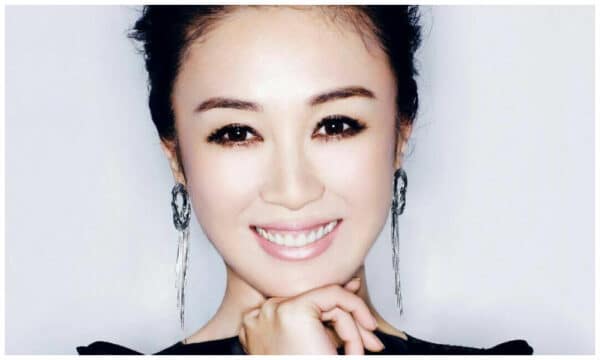
Fu Yiwei (傅艺伟, 1964) is an award-winning Chinese actress known for, among others, her role as Su Daiji in the TV series The Investiture of the Gods (封神榜). She was married (and divorced) two times, and has a son.
Fu made headlines in February of 2016 when Beijing police reported the actress was arrested for using drugs and allowing two others to use drugs in her apartment in Liangmahe, Beijing.
It was previously already rumored the actress was using drugs due to her behavior and facial expression when she appeared in talk shows years before.

The actress was sentenced to prison was released in April of 2016, after which she issued a public apology on Weibo.
Where is she now?
Fu has not gone back to the entertainment industry as a major actress after her drugs scandal. According to 2021 reports, Fu Yiwei lives in a luxurious house located in the center of Beijing.
She is still active on Weibo (@演员傅艺伟), where she occasionally posts an update.
#11 Ma Rong 马蓉
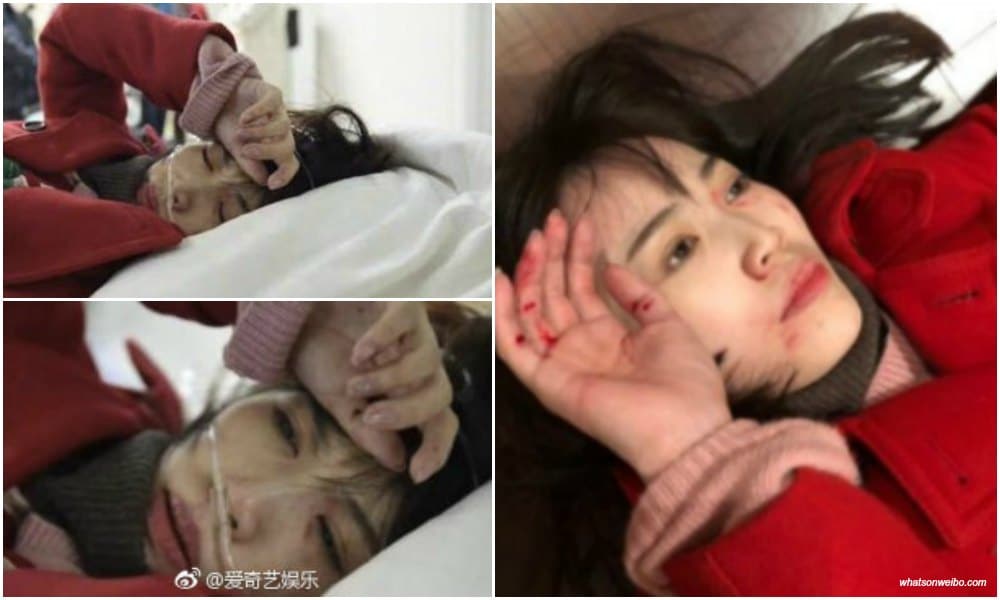
The marriage crisis between Chinese film star Wang Baoqiang (王宝强) and Chinese actress Ma Rong (马蓉) became the number one trending topic on Weibo on August 14 in 2016 when Wang published a message on his official Weibo account that he was divorcing his wife Ma Rong and firing his agent Song Zhe (宋喆), accusing the two of having secret affair.
Wang Baoqiang vs Ma Rong became the divorce of the decade, mainly because the story unfolded itself on Weibo. Online debates were fuelled by the public posts and comments published online by both Wang Baoqiang and Ma Rong.
Ma Rong became the main target of online vitriol, as the majority of Weibo’s netizens sided with the popular actor Wang Baoqiang, saying that Ma Rong was a cheater who only married Wang for his money.
In December of 2018, Ma Rong accused her ex-husband of attacking her, and dramatic photos of a seemingly injured Ma Rong soon spread on social media. Ma Rong spoke to reporters while lying in her (hospital) bed, tearfully speaking about Wang abusing her. Later on, however, security footage from surveillance cameras at Wang’s house leaked online and showed how it was Ma who came to Wang’s house, carrying scissors with her to intimidate Wang’s family. The actress was then accused of staging the entire incident.
In the midst of all controversy, Ma Rong became one of China’s “most-hated” celebrities.
Where is she now?
Ma Rong is still often being scolded on Chinese social media, and her name will probably be tarnished for a long time. Nevertheless, the actress is occasionally still posting on her Weibo account and Xiaohongshu, and whenever she is spotted out in public, she looks well-dressed and always wears expensive clothing and jewelry.

#12 Li Xiaolu 李小璐

Li Xiaolu (李小璐, 1982), also known as Jacqueline Li, is a Chinese actress and singer who was once the youngest actress to win the Golden Horse Award for Best Leading Actress in Xiu Xiu: The Sent Down Girl (天浴). In 2012, Li married the famous Chinese actor Jia Nailiang (贾乃亮), with whom she had a baby shortly after.
In late 2017, Li got into a huge scandal when she was photographed spending the night at the home of The Rap of China rapper PG One. Since Li was still married at the time, social media blew up over this ‘cheating gate’ (出轨门), especially because Jia Nailiang was asked on live-stream where his wife was and he allegedly replied: “Getting her hair done!”
In October of 2019, older videos leaked online that showed Li and PG One kissing and behaving like a couple. A month later, Jia and Li announced they were getting divorced.
The extramarital affair meant a major blow to Li’s reputation as she was now being ‘canceled’ by the public and labeled as a “bad record performer” (劣迹艺人).
Where is she now?
Li Xiaolu still has her Weibo account with over 44 million followers. She often posts content related to her 8-year-old daughter, and she also does sponsored content and livestreams.
Although Li still has her fans and is probably doing well with selling products online, her name still often comes up in a negative way, and controversy seems to follow her to this day – many netizens think the actress is unethical for her past affair and for the way she dresses and raises her daughter.
#13 Chen Yufan 陈羽凡
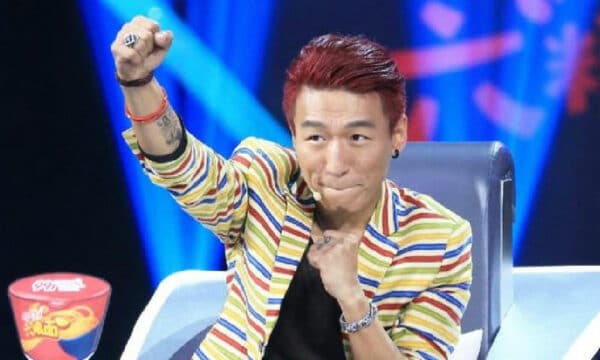
Chen Yufan (陈羽凡, 1975) is a Chinese actor and singer-songwriter and half of the popular pop duo Yu Quan (羽泉). In 2018, Chen became a ‘tainted celebrity’ when Beijing authorities announced on Weibo that the artist had been arrested for drug possession after they had received tips from the public.
As reported by SupChina at the time, the singer at home joined by another person when the police caught him with 7.96 grams of crystal meth and 2.14 grams of marijuana. Both Chen and the 25-year-old female he was with tested positive for illegal drugs.
Chen was detained, labeled a “drug addict,” and was ordered to pay regular visits to a local rehab center for three years.
Later, Chen’s musical partner and friend of twenty years, Hu Haiquan (胡海泉) posted on Weibo that he was hurt by Chen’s actions, which also affected their fans. Their upcoming concert was canceled and the duo band, which was established in 1998, was dissolved.
Where is he now?
Although Chen still has his Weibo account, he barely uses it. The singer has withdrawn from the public eye.
Chen divorced his ex-wife Bai Baihe (白百何) in 2015, but the two are still spotted together since they have a child together. Chen now has a new girlfriend, the much younger He Shizhen (何时珍). Prior to his drugs scandal, Chen’s love life was also a trending topic on Chinese social media, as Chen and Bai only disclosed their divorce in 2017 after rumors of cheating surfaced online.
Whenever Chen is seen in public somewhere, netizens comment on his appearance; Chen seems to have gained weight and often looks a bit sloppy.
Chen is a shareholder in various companies and is now working behind the scenes in the music industry. According to the latest articles, Chen has also opened his own recording studio.
#14 Fan Bingbing 范冰冰
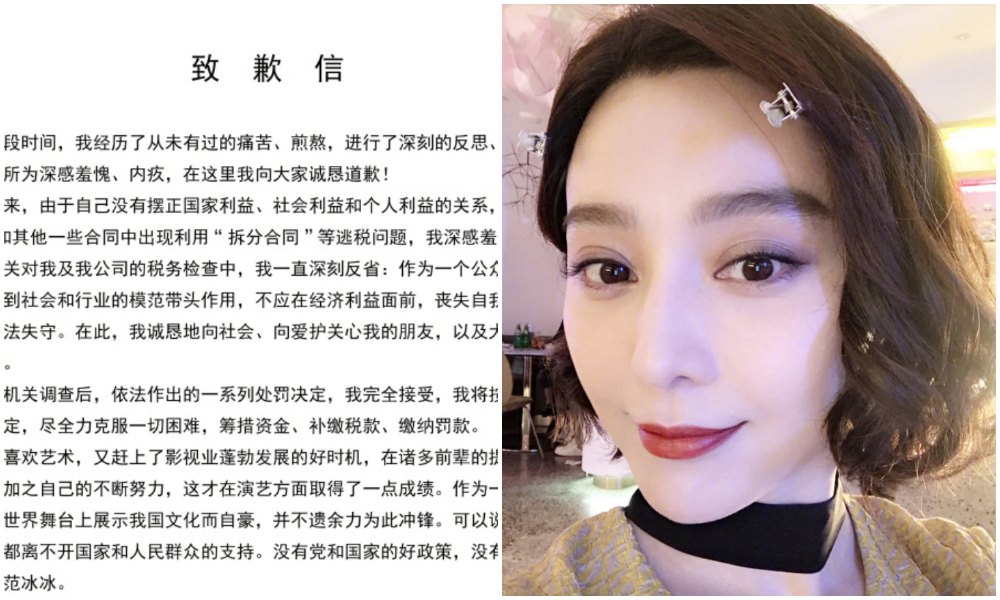
Fan Bingbing, one of the most renowned and highest-paid actresses in China, found herself at the center of a social media storm in late May of 2018.
The actress allegedly received a total payment of 60 million yuan ($9.3 million) for just four days of work on the film Cell Phone 2, of which she supposedly only declared 10 million ($1.56 million) to authorities.
The tax scandal first came to light when Chinese TV host Cui Yongyuan (崔永元) leaked two different contracts on social media; the one that allegedly showed that the actress was paid a total of 10 million RMB for her work, with another showing payment of 50 million RMB for the exact same work. These types of contracts are called yin-yang contracts (阴阳合同), an illegal practice to avoid paying taxes.
What followed after the scandal was months of silence and rumors. The actress was last seen in public on July 1st, and social media rumors alleged the actress might have left the country and that she was banned from acting for three years. At one point it was even rumored that the actress had been arrested.
Where is she now?
In October of 2018, Chinese state media reported that Fan Bingbing had been ordered to pay taxes and fines worth hundreds of millions of yuan over tax evasion and that the actress would not be held criminally liable if she would pay the penalty in time.
That same day, Fan came out with a public apology. Her Weibo account stayed up.

The actress launched her own beauty brand, Fan Beauty Secret (Weibo), in 2019. She has not completely won back the favor of Chinese netizens, who recently slammed her for posting “staged” photos of herself ‘working’ on her beauty product formulas in a lab.
Despite all controversy, Fan has done remarkably well in staying in the spotlight, unlike most others in this list. She still has over 64 million fans on her Weibo account and she is active as a brand ambassador for various companies, including the Be Strong formula (花冠贝智康) and the Swedish Daniel Wellington.
#15 Wu Xiubo 吴秀波
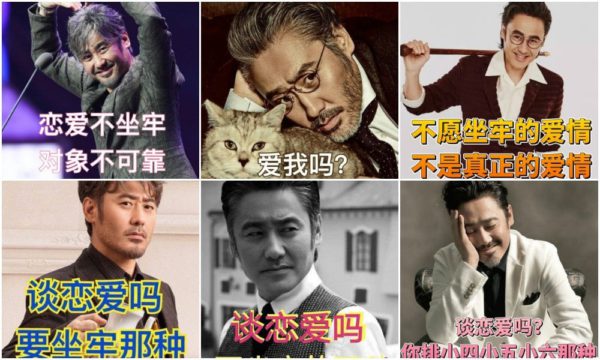
Beijing-born actor and musician Wu Xiubo (吴秀波, 1968) is famous for his role in many TV dramas and movies, including the television series Before the Dawn and the hit film Finding Mr. Right (北京遇上西雅图). His reputation suffered a serious blow when the actor, who has been married since 2002 and is the father of two children, was rumored to have been involved in various extra-marital affairs.
The scandal started in September 2018, when Chinese actress Chen Yulin (陈昱霖), also known as Ruby Chen, posted the history of her alleged seven-year relationship with the married actor on social media. She described the relationship as being one where Wu was very controlling of her. She also alleged that she received messages from other women, in 2013 and in 2017, who were also sexually involved with Wu.
In January of 2019, Chen’s parents published a statement on social media in which they claimed their daughter was asked to deny the allegations she had made against Wu in return for money. After Wu’s legal team and Chen had made an arrangement, Chen returned to mainland China to settle the matter. The moment she landed at Beijing airport in November of 2018, she was arrested by local Beijing police for blackmailing Wu.
Chen, who was detained since November of 2018, was eventually sentenced to three years in prison and she was released in 2021.
Although Chen was found guilty, Wu Xiubo’s reputation was ruined. Many people felt that how he dealt with Chen was wrong and that he was evil for having extramarital affairs in the first place.
Following the controversies, Wu Xiubo was blocked by major Chinese television stations and some of the programs he appeared in were no longer aired. Wu would originally host the 2019 Spring Gala, but his role was canceled. The romantic drama film Someone Like It Hot 2., that was scheduled to release in 2019, was also canceled and many variety shows that featured Wu were taken down or reshot.
Where is he now?
Since the scandal made headlines, Wu rarely makes public appearances. In late 2019, Wu did post a video message to support arts students preparing for the national college entrance exam. According to Global Times, many did not appreciate his temporary ‘comeback,’ with some bloggers calling him ‘pathetic.’
He is still on Weibo (@吴秀波), where he has 8,5 million followers, but he barely posts updates. On a ‘super topic’ fan page that is dedicated to the actor, fans still post photos of him every day.
There are ongoing rumors about the financial difficulties the actor is facing. In 2020, he sold his mansion in San Marino, California, at a loss. The actor is a shareholder in multiple companies and he is still married to his wife. A comeback to China’s entertainment industry seems unlikely for now.
#16 Zhai Tianlin 翟天临

Zhai Tianlin (翟天临, 1987)- also known as Ronald Zhai – is a well-known actor in China for his work in various films and TV dramas. He starred in, among others, the acclaimed series White Deer Plain (白鹿原).
In 2019, the actor got caught up in controversy over alleged academic misconduct. The actor had been admitted to the Beijing Film Academy in 2014 as a doctoral candidate in Film Science and received his PhD in June 2018. In 2019, the actor shared his joy over being accepted into Peking University for postdoctoral research.
Zhai’s new journey, however, led to online investigations into his previous academic works. As reported by BBC at the time, the South China Morning Post spotted discrepancies in Zhai’s submissions and widespread doubts over Zhai’s academic achievements began to circulate online.
One of Zhai’s essays did not contain any citations, and another showed many similarities with an article previously published in 2006. Some netizens started comparing the essays and found that 40% of Zhai’s essay was copied.
Doubts about Zhai’s academic performance were already raised when, during a live video session, Zhai showed ignorance of the CNKI (China National Knowledge Infrastructure), a digital library that most scholars are usually using, or at least are aware of.
In light of the online controversy, Beijing Film Academy set up an investigation process, which eventually led to Zhai’s PhD being revoked in February of 2019 due to plagiarism. The incident meant the end of Zhai’s academic career and tarnished his reputation.
Where is he now?
Zhai has not made headlines since his academic plagiarism controversy, which also ended his flourishing career in the entertainment industry. He still has over 10 million followers on his Weibo account (@翟天临), but hasn’t participated in any major works since the incident.
According to some reports from 2021, Zhai has started his own acting training classes, suggesting his future career will mainly take place behind the scenes.
#17 Zhao Lixin 赵立新
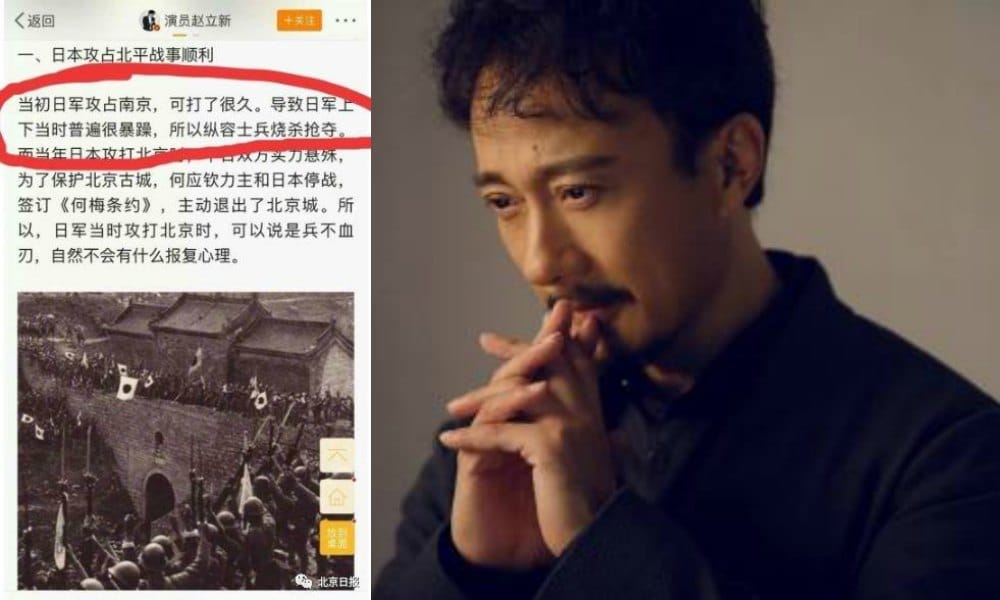
The 2019 case of Zhao Lixin (赵立新, 1968) is arguably the most similar in context to that of Zhang Zhehan, who got caught up in controversy in August of 2021 and is also on this list.
The Weibo account of Zhao Lixin was closed after the Chinese-Swedish actor made controversial comments on the Second Sino-Japanese War. Zhao Lixin was mainly known for his roles in TV dramas such as The Legend of Mi Yue, Memoirs In China, and In the Silence.
On April 2nd of 2019, the actor, who had more than 7 million followers, posted a message on his social media account that questioned why the Japanese military did not pillage and destroy the Beijing Palace Museum during the Second Sino-Japanese War:
“The Japanese occupied Beijing for eight years. Why didn’t they steal relics from the Palace Museum and burn it down [during that time]? Is this in line with the nature of an invader?”
The actor also commented on the Nanjing Massacre of 1937, suggesting that it was a consequence of Chinese resistance to the Japanese invasion.
His comments caused a social media storm with people accusing the actor of defending the Japanese. A lengthy apology by Zhao did not help. Besides being blocked from Weibo, he was also criticized and boycotted by state media and his most recent TV production was canceled.
Where is he now?
It has been over two years since Zhao was basically banned and lost the opportunity to do movies and TV dramas. Although it was initially rumored that the actor had been deported (he has Swedish nationality), he actually kept a low profile and made new plans.
The actor actually performs at a ‘live theater bar’ in Beijing, where people can have drinks and food while enjoying drama performances by professional actors. According to the latest reviews, the bar is always fully booked and there are raving reviews.
Other sources claim the artist also gives theater workshops for aspiring actors. The workshops, that are not cheap, are apparently a success.
Although Zhao has not returned to Weibo, there is a ‘super topic’ fan club dedicated to him on the platform.
#18 Tong Zhuo 仝卓
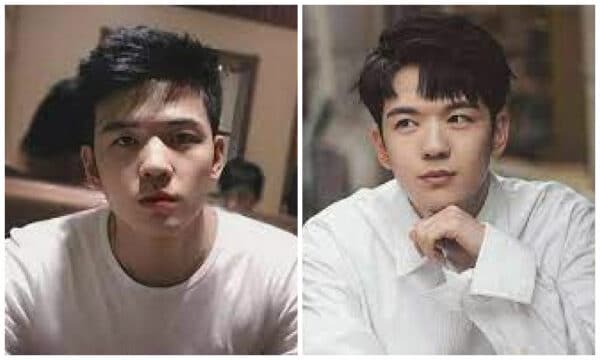
Tong Zhuo (仝卓, 1994) is a Chinese singer, actor, and TV host from Shanxi who became a trending topic in June of 2020 when it was discovered he had committed fraud during the gaokao, the national college entrance exam.
The scandal first broke when Tong was chatting with fans during a live stream. While giggling, he admitted that he had forged his identity for the gaokao: “We used a lot of so-called guanxi (connections) and then I became a fresh high school graduate,” said Tong, 26, laughing with one hand over his mouth.
Tong Zhuo said he had initially failed his college entrance exam in 2012. In order to be able to get into a top art school that only accepts recent high school graduates, he changed his personal information when he participated in the gaokao the next year in 2013 and faked being a fresh graduate.
Tong’s own confession led to an investigation by the Shanxi provincial education department. Another investigation also looked into the role of his stepfather Tong Tianfeng, a deputy secretary-general in Linfen city.
Tong Zhuo was eventually stripped of his graduation certificate by the Central Academy of Drama. His stepfather Tong Tianfeng was removed from office, and three education officials were put under police custody for allegedly forging documents.
Where is he now?
Tong Zhuo is still very active on his social media, posting selfies and vlogs. He also still performs, although he has not participated in any big media performances since the scandal.
#19 Zheng Shuang 郑爽
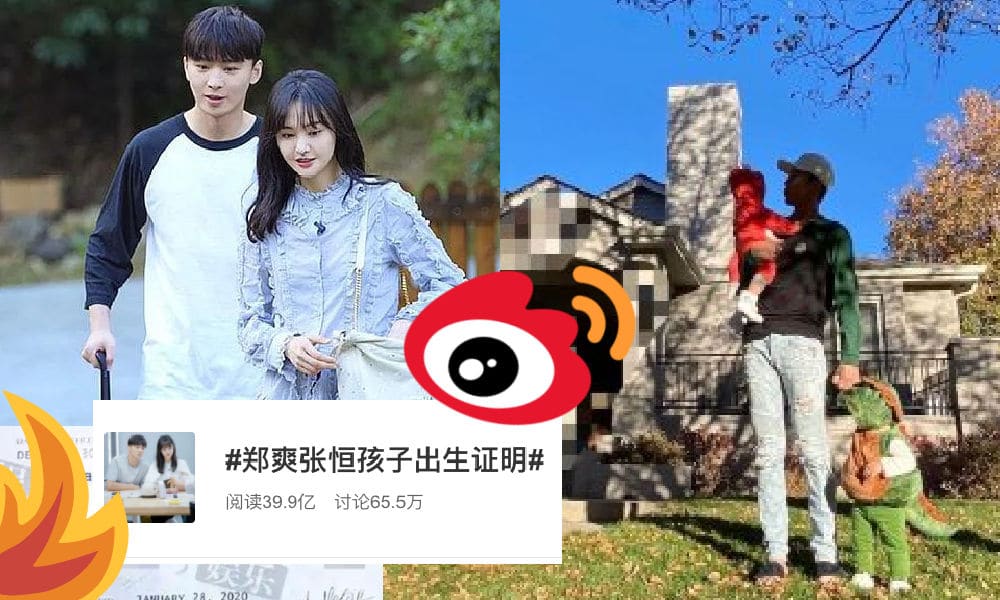
Zheng Shuang (郑爽, 1991) became one of the biggest trending topics of 2021 when the Chinese actress got caught up in a surrogacy scandal. Zheng rose to fame when she starred in a popular TV series in 2009 (Meteor Shower 一起来看流星雨). She became an award-winning actress and was chosen as one of the most bankable young actresses of the post-90s generation. On her Weibo account, she had over 12.4 million followers.
The scandal came to light when it appeared that Zheng’s had separated from her partner Zhang Heng (张恒). The former couple had two children in the US through a surrogacy arrangement, but Zheng Shuang allegedly refused to have them because she and Zhang had broken up – even though her name was on their birth certificate.
The situation, which was soon dubbed ‘Surrogacy Gate’ (‘代孕门’), left Zhang Heng stranded in the United States with the two babies. He claimed he was unable to bring them back to China with him since Zheng did not cooperate with the necessary legal procedures.
In light of the controversy, Italian fashion brand PRADA fired Zheng as their brand ambassador, and other companies, including Lola Rose and Chioture, also ended their partnership contracts with the actress.
Zheng’s professional career suffered a major blow when Huading Awards announced it would revoke Zheng’s honorary titles, including former awards for best actress and favorite TV star. The celebrity was also boycotted by China’s State Administration of Radio, Film, and Television.
Where is she now?
Zheng Shuang is still very much caught up in this scandal, and she might not leave it behind her any time soon.
In late July of 2021, her ex-partner posted a lengthy and angry blog on his Weibo where he aired the dirty laundry regarding their legal struggles and personal conflicts. This post came after Zheng herself broke her six-month social media silence to apologize for her surrogacy scandal.
Another apology followed in August of 2021, on the same day when it became known the actress had to pay a $46 million fine for tax fraud. This all happened during the “August 26/27 Chinese celebrity earthquake.” Zheng Shuang also saw her online fan circles removed, and several TV dramas Zheng acted in were removed from major video platforms.
Zheng currently has court-ordered visits with her children in the US (her ex-partner has custody). According to Today Online, Zheng has officially moved to America and is not doing well financially.
In social media posts that seem to have been removed later on, Zheng claims that her family’s bank accounts have been blocked and that she has no income since she is not allowed to work in the US. She wrote:
“If it makes you feel any better, I can tell you that I drink tap water every day to survive, I own a total of five T-shirts and two pairs of jeans, and I have never ordered delivery,” she wrote. “I even need to be frugal when buying sanitary napkins, and toilet paper has to be used sparingly.”
What sets Zheng Shuang apart from some of the other ‘canceled’ celebrities in this list, is that she still has her social media accounts and a loyal fan following. She might lack toilet paper, but she still has 12,3 million followers on her Weibo account.
#20 Zhang Zhehan 张哲瀚
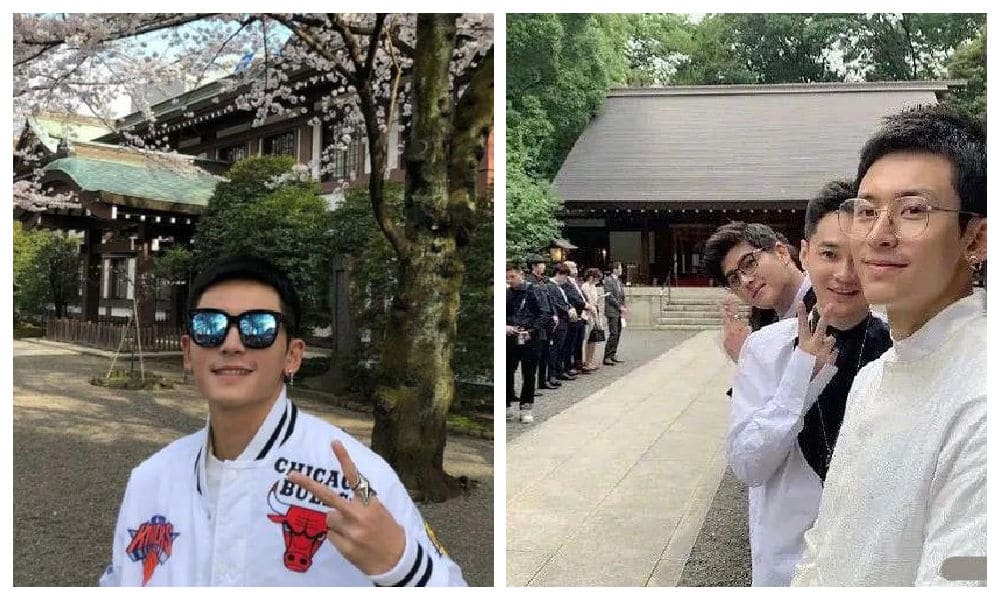
Chinese actor Zhang Zhehan (张哲瀚, 1991) got caught up in controversy in August 2021 when photos of him visiting Japan’s Yasukuni Shrine and attending a wedding at Nogi Shrine went viral on social media. The fact that some of these photos were three years old did not seem to matter: Zhang received serious backlash for being ‘unpatriotic’ and was even accused of being a traitor to his country.
While Nogi Shrine was established to honor General Nogi Maresuke, who led Japan’s military during the First Sino-Japanese War (1894-1895), Yasukuni Shrine is dedicated to the Japanese soldiers who sacrificed their lives for the emperor, including those who committed war crimes in China. It is generally seen as a symbol of Japanese military aggression and as a painful reminder of the numerous atrocities committed by Japanese soldiers in China and other Asian countries.
Although Zhang Zhehan rushed to apologize for his “ignorance” regarding these historically sensitive places and expressed his love for China, it did not settle the social media storm. All the companies that previously worked with the Chinese celebrity, including Coca-Cola, Taobao, and Clinique, soon announced the termination of their partnership.

Zhang was also a brand ambassador for Yanjing’s Xuelu beer. Thousands of beer cans with his face became virtually useless after the controversy. Photos showing the abandoned beer cans were shared online by people at the warehouse, who claimed the beer would be destroyed since companies allegedly had even refused to get them for free.
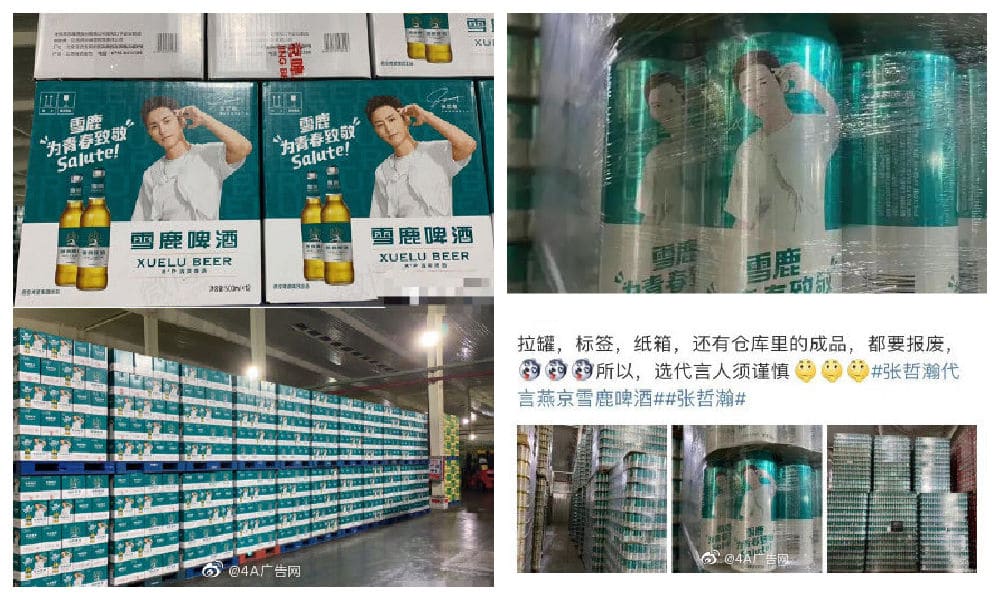
On August 15, within 48 hours after the controversy erupted, Sina Weibo announced that it would shut down Zhang Zhehan’s personal account, his studio account, and the ‘super topic’ fan page dedicated to him. The Weibo Administration (@微博管理员) wrote: “As a public figure with a large following and many fans, establishing correct historical views and values is the most basic level of professional ethic and the bottom line that must be adhered to – ignorance can never be an excuse.”
That same day, the China Association of Performing Arts also released a notice in which they called on members to boycott the actor for “negatively influencing the mass audience of youths.” The actor was also criticized by the official media.
Where is he now?
As the dust has not settled yet, it is still too early to draw any conclusions on how this controversy has affected Zhang, but it is safe to say that Zhang’s life radically changed within a matter of just a few days. The photos he took at two historically sensitive Japanese shrines meant a potential end to his career – no social media, no brand partnerships, and an industry boycott. Just a year prior, the actor had been given an award for Rising Artist of the Year.
Despite all controversy, Zhang still has a loyal fanbase. Although Zhang no longer has his own social media accounts, some of his fans on Weibo are posting messages wishing him well. Update: also read this Op-Ed on Zhang Zhehan here: Cyber Bullying and Fake News – What You Should Know About the Zhang Zhehan Story.
#21 Kris Wu 吴亦凡
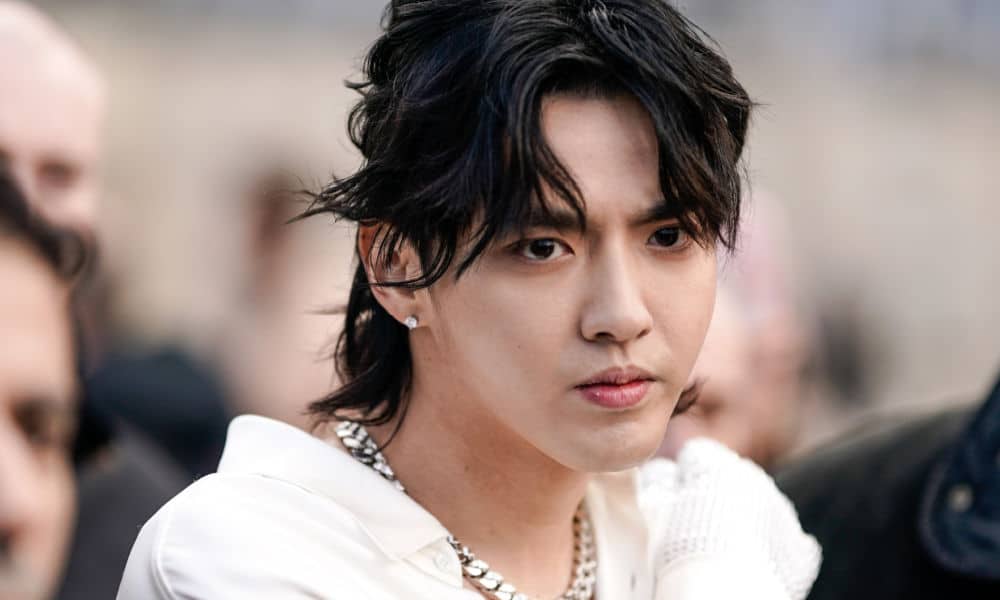
The Chinese-Canadian superstar Kris Wu, better known as Wu Yifan (吴亦凡) in China, became a trending topic on Chinese social media in the summer of 2021 after he was accused of grooming underage girls and pressuring women into sex.
The 19-year-old student Meizhu Du (都美竹) was the first to accuse Wu of predatory behavior, with at least 24 more women coming forward claiming the celebrity showed inappropriate behavior and luring young women into sexual relationships.
Although Wu denied all allegations, the superstar was detained on suspicions of rape on July 31st. Weibo’s servers barely seemed to be able to handle the spike in traffic after the news came out, and comments came pouring in.
Shortly after Wu’s detainment, his Weibo account got shut down and more than a dozen firms either cut ties or terminated contracts with him. As the scandal unfolded, various hashtags related to the story received billions of views on Weibo.
Wu was later further erased from Chinese social media; various accounts showing support to the singer were taken offline, and his music was removed from the major Chinese music streaming platforms.
On August 16, Kris Wu was officially arrested.
Where is he now?
At this point, it is still unknown what sentence Kris Wu will face, and whether or not the singer will enter a guilty plea which might speed up the legal procedures.
If the Chinese-Canadian celebrity is convicted, it is probable that he will serve his sentence in China and then be deported to Canada (he holds a Canadian passport). Chinese state media reported that Wu may be sentenced to 10 years to life if all allegations turn out to be true.
Although Kris Wu might face a grim future, it is noteworthy that the star, despite being virtually wiped from social media, still has many loyal fans who would gladly welcome him back.
#22 Zhao Wei 赵薇

On August 26 of 2021, the name and works of one of the country’s most notable actresses, Zhao Wei (赵薇 aka Vicky Zhao, 1976) were removed from Chinese online channels. Searching for Zhao Wei’s name on Chinese video platforms Tencent Video, iQiyi, and Youku suddenly came up with zero results, and her name had vanished from the cast lists of the many films and dramas she featured in.
Zhao Wei’s sudden disappearance from the top entertainment websites sent shockwaves over social media. Zhao Wei was clearly ‘canceled’ by higher authorities, but the exact reason why was still unknown by September 2021 – although there was much speculation on what the reason could be.
By early September, celebrity friends of Zhao had removed photos taken together with the actress, and Baidu Baike, also known as the Chinese Wikipedia, had even erased the name of the actress from the pages of the TV dramas and films she featured in (although she still had her own wiki page at this time).
This was not the first time that Zhao got caught up in controversy, although it was never this bad before. In 2001, the actress wore a mini-dress printed with the old Japanese naval flag during a fashion shoot, triggering major backlash over her perceived lack of sensitivity to historical matters.
Where is she now?
At the time of writing, Chinese netizens are still waiting for answers on what has caused Zhao Wei being erased on Chinese online channels. Some rumors say the actress has fled to France, where she has property, but nothing is confirmed at this time.
Zhao Wei does still have her Weibo account, where she has over 85.6 million followers.
#23 Qian Feng 钱枫

Just a week after Kris Wu was arrested, the popular Chinese television host Qian Feng was accused of rape in August of 2021. Qian is primarily known as the host of “Day Day Up” (天天问上), a popular Chinese talk show broadcast on Hunan Television.
As reported by Sixth Tone, a woman by the name of Xiao wrote on Weibo that the 37-year-old TV host raped her while she was drunk and unconscious. The incident allegedly happened in 2019.
Although Xiao had reported the incident to the police, it did not lead to an arrest due to a lack of evidence. After Xiao’s post went viral, Shanghai authorities issued a statement to explain why the investigations came to an end and that they welcome Xiao to provide new evidence.
Pending investigations, Hunan TV suspended Qian Feng. One Weibo hashtag related to the accusations against Qian received over two billion views (#钱枫被曝性侵#).
Where is he now?
On August 27 of 2021, Qian Feng came out with a statement on his Weibo account (@钱枫oscarqian) in which he indicated that the investigations into the case were already rightfully concluded in 2019 and that he placed his trust in the Chinese legal system.
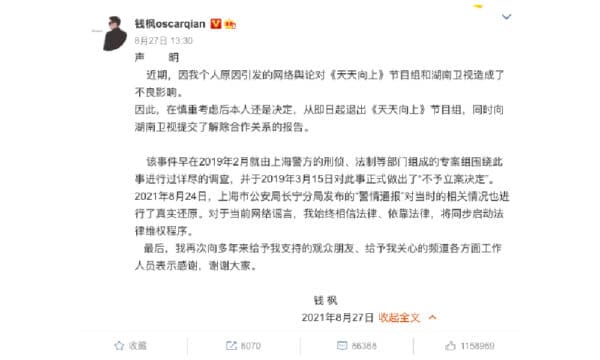
At the same time, he shared that he had terminated his contract with Hunan TV.
#24 Henry Huo 霍尊 (Huo Zun)

Henry Huo (霍尊, 1990) is a Chinese singer-songwriter and actor who gained nationwide fame after winning the first season of Sing My Song (中国好歌曲). Henry was asked to perform in the CCTV Chinese New Year Eve Gala and was awarded the title ‘2014 Drama King.’
In the summer of 2021, Huo announced his withdrawal from the popular TV show Call Me By Fire after his ex-girlfriend Chen Lu (陈露) publicly accused him of being a serial cheater and leaking WeChat conversation screenshots to prove that he actually disliked the show.
On August 14, Huo issued an online apology for the recent controversy, saying sorry for his misbehavior and the “bad social influence” he had caused.
Besides Huo’s exit from Call Me By Fire, the controversy also led to Huo’s first performance on the show being removed.
During China’s “entertainment circles earthquake” of August 26 and 27 (more here) online fan groups to Huo were shut down, and his Weibo account was temporarily disabled.
Where is he now?
Henry Huo is still on Weibo (@霍尊), where he has over 8.7 million fans, but his account is still disabled.
Huo’s entry in the mainstream online encyclopedia Baike has been altered and now includes the recent controversy. It is not clear at this point if Huo’s withdrawal from China’s entertainment industry is a temporary or a permanent one.
#25 Gao Xiaosong 高晓松
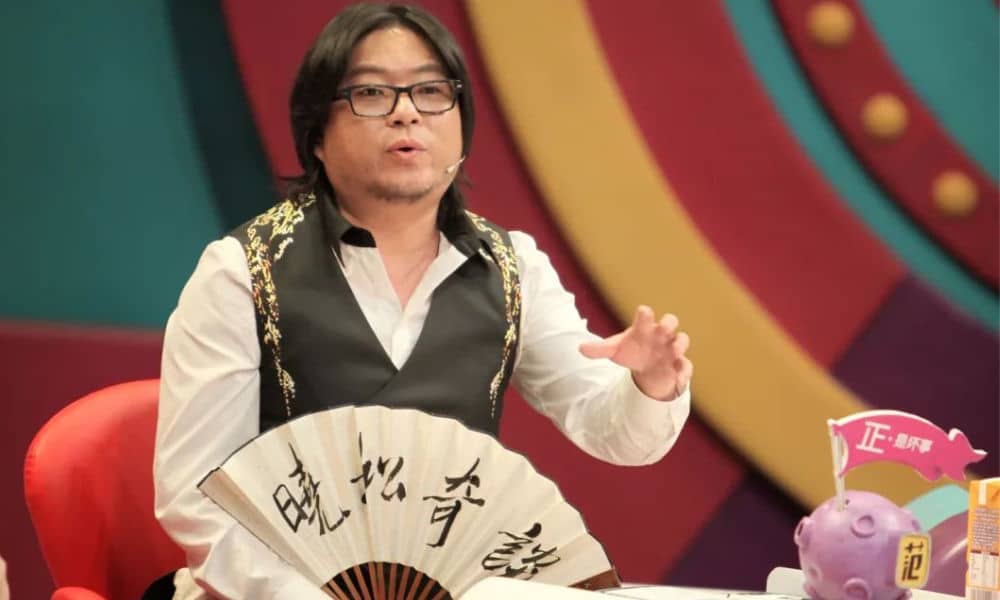
In late August of 2021, the work of the famous musician, TV host and co-founder of Alibaba Music Group Gao Xiaosong (高晓松) was taken offline. Among the erased works are his TV show (Xiaosong Pedia 晓松奇谈, removed from video platforms such as iQiyi) and the books he wrote (no longer available on various e-commerce platforms). There was no official reason given for Gao being canceled like this.
However, the Chinese Historial Research Institute (中国历史研究) published a post on Weibo about Gao, criticizing him for historical nihilism and for “openly attacking and slandering our people’s army” during his talks on his TV show.

Throughout his shows, Gao made various remarks about the Sino-Japanese War, sometimes mentioning views or perspectives that go against the official Chinese narrative. Gao also visited the controversial Yasukuni Shrine and allegedly expressed his sympthathy with those Japanese people visiting the shrine to commemorate their loved ones who died in the war.
Yasukuni shrine is dedicated to the Japanese soldiers who sacrificed their lives for the emperor, including those who committed war crimes in China. It is generally seen as a symbol of Japanese military aggression and as a painful reminder of the numerous atrocities committed by Japanese soldiers in China and other Asian countries. In the article by the Chinese Historical Research Insititute, Gao is accused of “defending Japanese militarism.”
Where is he now?
Just like other celebrities caught up in the recent ‘entertainment circles cleanup’, much is still unclear about why Gao was canceled and what his future will look like. Some rumor that the online erasure of both Gao and Zhao Wei might be connected to their links to the Alibaba Group.
At the time of writing, no official statement was given yet by authorities nor by Gao himself.
By Manya Koetse (@manyapan)
Spotted a mistake or want to add something? Please let us know in comments below or email us. First-time commenters, please be patient – we will have to manually approve your comment before it appears.
©2021 Whatsonweibo. All rights reserved. Do not reproduce our content without permission – you can contact us at info@whatsonweibo.com.
Manya is the founder and editor-in-chief of What's on Weibo, offering independent analysis of social trends, online media, and digital culture in China for over a decade. Subscribe to gain access to content, including the Weibo Watch newsletter, which provides deeper insights into the China trends that matter. More about Manya at manyakoetse.com or follow on X.

China Arts & Entertainment
The Wong Kar-wai Scandal Explained: The Dark Side of ‘Blossoms Shanghai’
Whenever reports surfaced about the harsh conditions on Wong Kar-wai’s sets, mainstream media and fans often brushed off his tyrannical habits as the quirks of a genius. This time, it feels different.
Published
2 weeks agoon
October 3, 2025By
Ruixin Zhang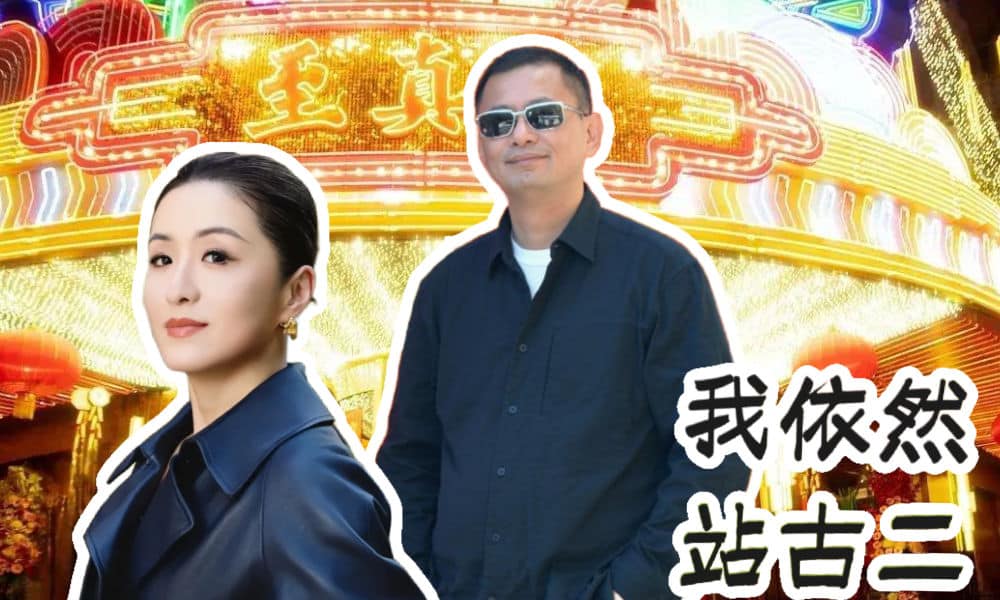
After renowned director Wong Kar-wai was accused of exploiting a young writer during the production of the hit TV drama Blossoms Shanghai, a scandal unfolded that may be one of the biggest stories in China’s entertainment industry this year.
Even if you don’t recognize him by face, you most likely know him by name: Wong Kar-wai (王家卫, 1958), the internationally acclaimed Hong Kong movie director.
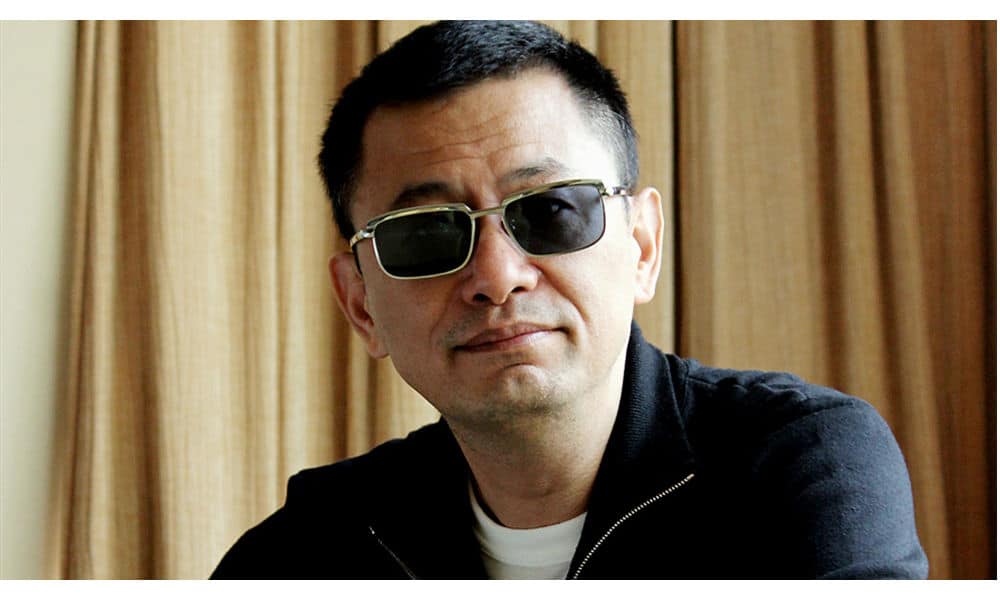
Director Wong Kar-wai, characteristically in sunglasses. (Image via Iazimao).
In late 2023, Wong Kar-wai released his first television series, Blossoms Shanghai (繁花), which was referred to a being the third part of an informal Wong Kar-wai trilogy that started with his films In the Mood for Love and 2046. Thanks to its superior production quality, star-studded cast, and Wong Kar-wai’s signature visual style, it became one of the most talked-about Chinese TV dramas of the time.

Scenes from Shanghai Blossom.
Adapted from Jin Yucheng’s award-winning novel, Blossoms Shanghai is set in 1990s Shanghai and tells the story of a young man, A Bao (played by Hu Ge 胡歌), who aspires to become a successful businessman and self-made millionaire during China’s booming reform era. The series contrasts the protagonist’s troubled past with the city’s vibrant present—and even sparked a wave of visitors to Shanghai landmarks featured in the show.
“Overnight, the headline “Wong Kar-wai Suspected of Exploiting Employees” became the biggest story in Chinese entertainment news”
However, in September, screenwriter Gu Er (古二,real name Cheng Junnian 程骏年) stirred controversy when he published a post on his WeChat official account, @GuErNewWords (古二新语), accusing Wong Kar-wai and lead writer Qin Wen (秦雯) of serious exploitation during the production of Blossoms Shanghai.
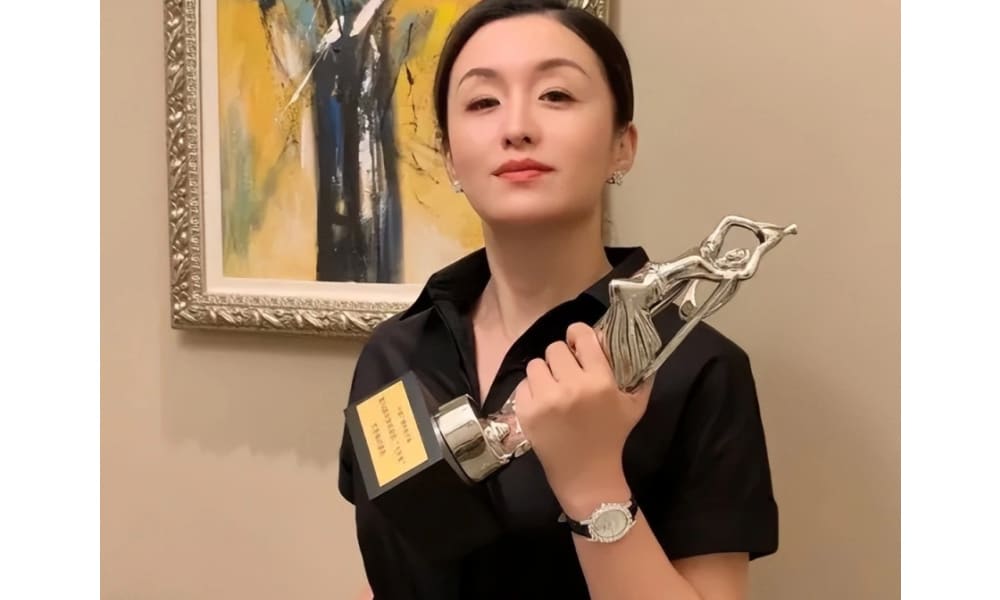
Qin Wen, image via Tencent News.
Overnight, the headline “Wong Kar-wai Suspected of Exploiting Employees” (王家卫《繁花》被爆疑似压榨员工) became the biggest story in Chinese entertainment news.
Gu Er is an experienced young screenwriter. After earning a master’s degree from the New York Film Academy, he returned to China, where he worked in theater and dabbled in online films. Though he never became a household name, he had carved out a modest presence in the entertainment industry.
According to a series of diaries he began sharing on WeChat in 2022, Gu Er first joined the Blossoms production team in 2019.

Example of Gu Er’s writings, where he talked about the difficult conditions of working on the Blossoms production.
He described the experience as “powered purely by love” (用爱发电)—in other words, long hours, meager pay, and sheer passion keeping him afloat. These early posts detailed many interactions with Wong Kar-wai and lead scriptwriter Qin Wen, but since the drama had not yet aired, his satirical, lightly veiled critiques attracted little attention.
“When the credits rolled, Gu Er’s name was nowhere to be found under the screenwriting slot”
In 2023, upon the premiere of the series, Gu Er published an article titled “The Truth Behind the Writing of Blossoms” (《繁花》剧本的创作真相). In it, he claimed to have written substantial portions of the storyline and character arcs—work that, he said, had been personally approved by Wong.
He also shared chat screenshots and presented several key concepts he had pitched, many of which viewers later recognized in the broadcast series.
Yet when the credits rolled, his name was nowhere to be found under the screenwriting slot. Instead, he was listed only as “preliminary editor” (前期责编), buried at the very end of the credits in a position so minor it was almost negligible.
For Gu Er, this was humiliating. He believed that his field research, character development, and story-building should have earned him recognition as at least one of the principal writers. The post sparked some discussion, but once again, the controversy quickly faded.

Cheng Junnian is Gu Er’s real name, and in the later recordings he posted, Wong Kar-wai also called him by his real name.
It wasn’t until September 16, 2025—nearly two years later—that Gu Er released another definitive essay, “My Experience as a Screenwriter for Blossoms: A Summary” (《我给〈繁花〉做编剧的经历——小结》).
This time, he laid bare every painstaking detail of his creative process for the main female character’s storyline. He claimed that the production refused to reimburse any of his research and interview expenses—not even for meals or books. He recalled one particular moment: “Once I spent 100 yuan [$7], and the Hong Kong producer immediately scolded me in public: ‘How does writing cost any money?’”
“It’s just a few thousand yuan; he is an assistant and can also write the script—it’s a bargain”
Besides writing duties, Gu Er said he also had to cook meals and run endless errands for Wong Kar-wai. In fact, Gu Er suffers from Kennedy’s disease, a motor neuron illness similar to ALS but slower in progression. Like ALS patients, he is gradually losing strength in his limbs. The intense, high-pressure work environment on set made his condition much worse. When he first told Wong Kar-wai about his health, Wong allegedly responded with nothing but suspicion: “What do you want from me?”

Gu Er, image from the time he was a guest chef at Dee Hsu’s reality show.
Wong Kar-wai wasn’t the only person Gu Er accused of exploitation. He also named lead screenwriter Qin Wen, one of the most prominent figures in Chinese television, known for hit dramas such as The First Half of My Life (我的前半生) and My Heroic Husband (赘婿). Qin is also credited as the screenwriter of Blossoms. According to Gu Er, once his draft script was handed to Qin Wen, she “made a few revisions,” and it was then presented as her work.
He further alleged that Qin tried to push him out of the production team, but Wong Kar-wai intervened, saying: “It’s just a few thousand yuan; he is an assistant and can also write the script—it’s a bargain.”
This post finally drew widespread attention. While the public was shocked by the alleged misconduct of a beloved director, many also questioned Gu Er’s credibility.
The Blossoms production team quickly issued a statement, asserting that more than 2,000 crew members had all been properly credited, and later clarified that Gu Er had only been part of the early-stage research team.
“The very type of boss you’d be too afraid to confront in your own workplace”
However, netizens began combing through Gu Er’s WeChat account and discovered that, in recent months, he had uploaded a series of audio recordings of conversations among the production staff—including Wong and Qin.
These recordings became crucial evidence in Gu Er’s defense. In one recording, a producer admitted that Qin had used ghostwriters and that several major plotlines had, in fact, been written by Gu Er. She also acknowledged that it would be difficult for him to receive proper credit.
Other tapes revealed the director’s harsh treatment of crew members; in one instance, Gu Er himself was publicly humiliated and accused of being “a dog using its master’s power” (狗仗人势).
On September 22, Gu Er released another recording. This time, it featured Wong Kar-wai and Qin Wen gossiping about several well-known actors; when the conversation ended, they asked Gu Er to serve them their food.
Having studied at Le Cordon Bleu in San Francisco, Gu Er had apparently been cooking for Wong without pay. Netizens were particularly angered by how arrogant and condescending Wong sounded in the recording, which many said reminded them of the very type of boss they had been too afraid to confront in their own workplaces.
At the same time, netizens dug up a 2024 report from Hong Kong’s Ming Pao (明报), which detailed how a female screenwriter’s script for Blossoms had also allegedly been exploited by Wong Kar-wai. That writer, too, reportedly suffered from depression as a result.
“The Gu Er incident is a snapshot of class solidification”
On September 23, Gu Er’s WeChat account was taken down, rendering all of his articles and audio recordings inaccessible.
Since both WeChat and the parent company of Blossoms’ production house, Tencent Pictures, are owned by Tencent, netizens immediately speculated that the platform had silenced Gu Er to contain the scandal. The move only fueled public suspicion that Wong had indeed exploited young writers—and calls grew louder for an official response from Wong Kar-wai.
As the controversy spread, screenwriter Qin Wen posted a denial on Weibo, insisting that she had been slandered.
Oscar-winning cinematographer Peter Pau (鲍德熹), who worked on Blossoms, also weighed in, saying that all responsibilities had been clearly outlined in the contracts and accusing Gu Er of deliberately stirring trouble. Hong Kong director Wong Jing (王晶) likewise voiced his support for Wong Kar-wai.
However, the broader public—the majority of netizens as well as many within the industry—stood by Gu Er.
The film news account Qiangbaoshan (@誓要抢包山) commented that regardless of the exact truth of Gu Er’s claims, it was already alarming and unjust that major figures in the film industry had banded together to discredit him while his own platform was banned.
Commenters on Xiaohongshu wrote thousands of posts in defense of Gu Er, calling the incident “a snapshot of class solidification,” or writing: “I also stand with Gu Er. Either you hire a proper chef, or you clearly define the work. If someone contributes ideas and creativity, then give them the pay and credit they deserve.”
Gu Er’s friend Ma Nong (玛侬) also published an article on her WeChat official account in his defense, sharing new photos of Gu Er at work and on set to prove that he had indeed played an important role in the Blossoms production.
Yet through it all, to this day, Wong Kar-wai himself has not uttered a single word in response.
“Because of his cinematic achievements, the media and fans often laughed off his tyrannical behavior as the eccentric quirks of a genius”
Some netizens, after learning the details, were puzzled by Gu Er’s behavior. They criticized him as weak and overly servile, suggesting that what he faced now was partly the result of his own personality flaws.
Yet this very dynamic may be why the public’s anger toward Wong Kar-wai ran so deep. Wong is arguably one of the most influential directors in Chinese cinema. Works such as In the Mood for Love, Chungking Express, and Happy Together have left an indelible mark on world cinema and inspired generations of filmmakers. For a relative ‘nobody’ like Gu Er, Wong Kar-wai would have seemed an idol—a god-like figure (Gu Er also expressed his love and admiration for Wong in his previous articles). And it may have been precisely this sense of awe and worship that left Gu Er vulnerable to workplace bullying and manipulation.
Wong Kar-wai’s harsh treatment of his actors and crew has actually never been a secret. Famous actors who previously worked with him, such as Leslie Cheung and Tony Leung, have spoken openly about his extreme working methods. After filming Happy Together, Leslie Cheung announced that he would never work with Wong again, later revealing that he felt the director had exploited his sexuality. During the shoot of Ashes of Time (东邪西毒), Cheung nearly died from poisoning in the desert. Even in their earlier collaborations, he was often tormented by Wong’s constant changes and endless demands.
Wong’s obsessive pursuit of his own has repeatedly come at the expense of those around him. While filming The Grandmaster, he reportedly withheld actress Song Hye-kyo’s passport and kept her on set for months, only to use a handful of shots in the final cut.
Yet, because of his cinematic achievements, the media and fans often laughed off his tyrannical behavior as the eccentric quirks of a genius.
After the Gu Er controversy, however, many began to re-examine the man behind the perpetual sunglasses—not as an untouchable auteur, but as an employer accountable for his power. Wong Kar-wai has long been known for procrastination, perfectionism, and “torturing actors,” but the stakes of this reputation now feel different.
Meanwhile, Gu Er’s WeChat account remains banned. It is difficult to imagine why a man already battling a degenerative illness would continue to fight so publicly for recognition, unless he felt he had nothing left to lose.
Writer Shuimuding (水木丁) raised deeper concerns about Gu Er’s desperate, all-or-nothing stance, reminding readers of the darker history of the Chinese film industry, where young talent has been pushed to despair—and sometimes even to death—by powerful figures. The most haunting example is Hu Bo (胡波), the brilliant director of An Elephant Sitting Still (大象席地而坐), who took his own life after facing similar pressures.
This is why the Wong Kar-wai scandal matters. No matter how talented the director, actual exploitation can never be justified for the sake of the project. Perhaps it is time to stop using exceptional artistic talent as an excuse for unacceptable workplace dynamics.
By Ruixin Zhang
Independently covering digital China for over a decade. Like what we do? Support us and get the story behind the hashtag by subscribing:
edited for clarity by Manya Koetse
Spotted a mistake or want to add something? Please let us know in comments below or email us. First-time commenters, please be patient – we will have to manually approve your comment before it appears.
©2024 Whatsonweibo. All rights reserved. Do not reproduce our content without permission – you can contact us at info@whatsonweibo.com.
China Arts & Entertainment
Evil Unbound (731): How a Chinese Anti-Japanese War Film Backfired
731 was China’s most anticipated war movie of the year — how could it fail so miserably to live up to public expectations?
Published
3 weeks agoon
September 24, 2025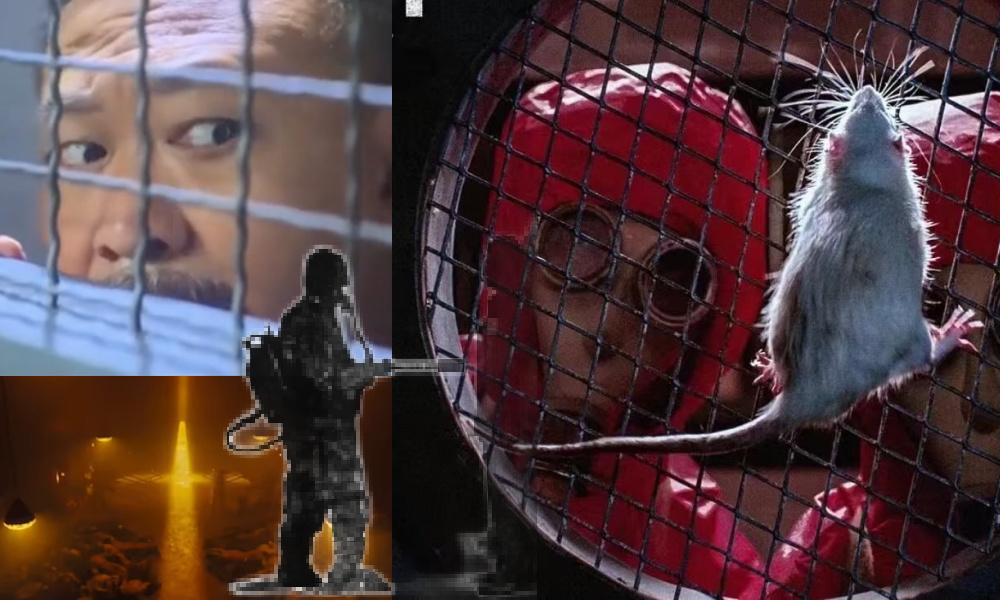
🔥 This is premium content and also appeared in the Weibo Watch newsletter. Subscribe to stay in the loop.
How did Evil Unbound (731), one of the most anticipated Chinese war movies of 2025, go from patriotic hype to online backlash? A deep dive into the official narrative, the audience reception, and everything that’s particular about this movie.
731 and 918, those were the numbers dominating Chinese social media over the past week. Both numbers carry heavy historical weight, but the recent discussions surrounding them reveal two parallel worlds of the official narrative vs the audience experience of a controversial new World War II film.
It was “9.18” on Thursday, when China commemorated the 94th anniversary of the September 18th Incident (九一八事变). On that day in 1931, a small explosion on a Japanese-owned railway near Shenyang (Mukden) was used as a pretext to invade Manchuria.
While many older Chinese were taught in school that the war began in 1937, recent state-led campaigns increasingly emphasize 1931 as the true beginning of China’s “14-year-long war” (1931–1945). Over the past decade, the 918 commemorations have become more prominent online, shaping public memory through nationalistic messaging.
This year, the commemoration had an extra dimension, as it wove the release of Evil Unbound (English title), also known as 731, into the patriotic media narratives around 918.
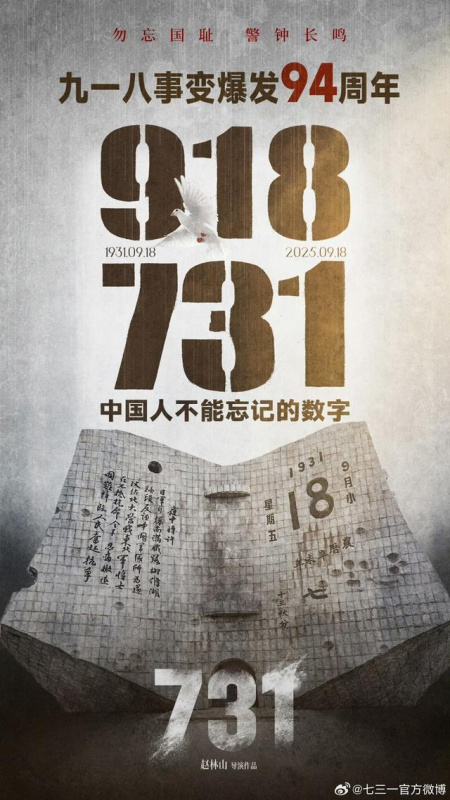
Patriotic film poster putting 918 and 731 together.
The much-anticipated war movie 731 depicts the atrocities of Japan’s Unit 731 (731部队), notorious for conducting horrific biological warfare experiments in Harbin during World War II under Major General Shiro Ishii (石井四郎), a former army surgeon and biologist with a particular interest in historical plagues. Under his command, Japan’s biological warfare and human experimentation in China were carried out on a larger scale than anywhere else between the 1930s and 1940s.
After the war, because the US felt his knowledge on bioweapons was of great value, Ishii was granted political immunity deal and was never brought to trial.
Together with the Nanjing Massacre, Unit 731 has come to symbolize the peak horrors of Japan’s wartime atrocities. Public attention for this history has grown in recent years, especially since the 2015 opening of the Harbin-based Museum of Evidence of War Crimes by Unit 731.
It was around that same time, about a decade ago, when Chinese director Zhao Linshan (赵林山) started working on the movie Evil Unbound (731), produced by Changchun Film Group in collaboration with the Propaganda Departments of Shandong, Jilin, Heilongjiang, and Harbin.
It finally premiered nationwide on Thursday, ‘9.18’ at exactly 9:18 and shattered 10 box office records on its opening day. Screened 258,000 times in a single day, it rapidly surpassed 200 million yuan (US$28 million) in ticket sales. After three days, the box office exceeded 1 billion yuan (US$140 million).
The film focuses on Unit 731 in the final days before Japan’s defeat in 1945, portraying how local salesman Wang Yongzhang (王永章, played by Jiang Wu 姜武) is imprisoned together with other civilians. They are promised freedom in exchange for “health checks and epidemic prevention cooperation,” and are subjected to frostbite experiments, poison gas, and vivisections.
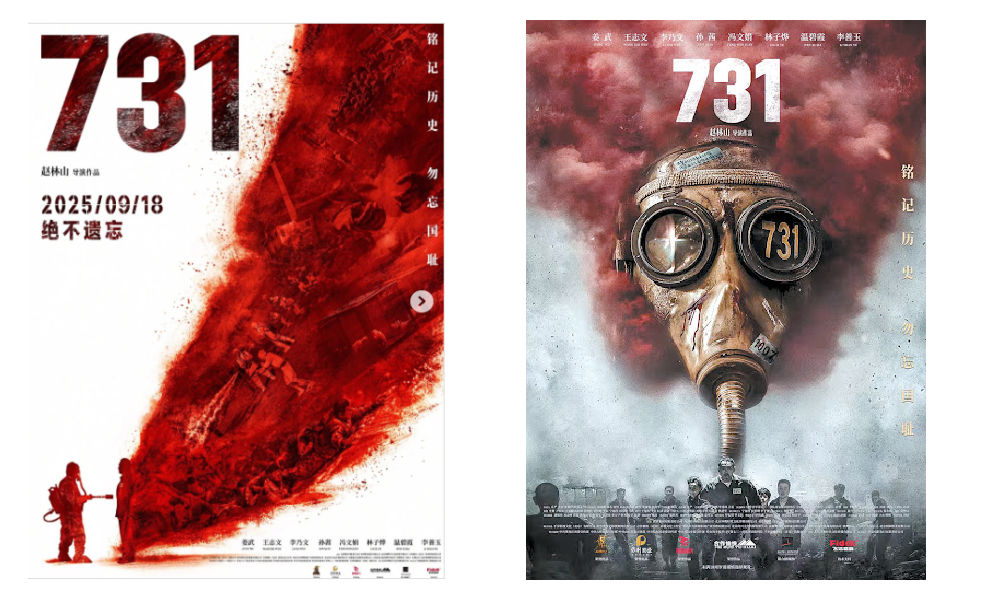
Official film posters for Evil Unbound/731.
“What we made is not a movie — it is historical evidence,” director Zhao said about the film.
A state-orchestrated hashtag ecosystem is currently amplifying the film’s ‘success.’ Similar to previous viral war film hits such as The Battle at Lake Changjin (长津湖) and Nanjing Photo Studio (Dead to Rights 南京照相馆), the media campaigns highlight the film’s commercial performance, its educational and historical value, the ‘authenticity’ of its production process, and its emotional reception and overseas recognition.
Recent trending hashtags, from Kuaishou to Weibo and beyond, include:
- 电影731票房再创新高 – “Film 731 sets another box office record”
- 没有人能在看731时不流泪 – “No one can watch 731 without crying”
- 观众掩面哭泣 / 哭到没法接受采访 – “Audiences cover faces in tears” or “Audiences too moved to be interviewed”
- 观众自发起立唱国歌 – “Audience spontaneously stand up to sing national anthem”
- 海外观众看731不停抹泪 – “Overseas audiences weeping when seeing 731”
- 9岁小孩看完731后泪奔 – “9-year-old child burst into tears after watching 731”
- 日本观众看完电影731后情绪崩溃 – “Japanese audiences having emotional breakdown after watching 731”
- 让731这段历史不再沉默 – “The history of 731 can no longer be silenced”
There are hundreds of other hashtags contributing to this official narrative, that portrays Evil Unbound as an absolute patriotic and commercial triumph.
From Anticipation to Backlash: 731 Between Shawshank and Squid Game
Outside of this official narrative, however, audiences are telling a very different story. Despite months of anticipation, the film has been met with overwhelmingly negative reviews.
On Weibo, the hashtag “731 Film Review” (#731影评#) was pulled offline. On Douban, the movie’s ratings meter was switched off entirely (“暂无评分”). On IMDb, the film is currently rated 3.1.
Usually, criticism of patriotic films is a slippery slope. People have been censored, blocked, or even detained for criticizing war films. But criticism of this film is so widespread, and so ubiquitous across social media platforms, that it is barely containable.
Many viewers called the movie “trash,” while others said they felt “defrauded”.[1] One commenter suggested the director tried to make The Shawshank Redemption but ended up with Squid Game.[2] Others called it “bizarre”[3], or concluded: “The short review section doesn’t even allow enough characters to describe how unbearable this movie is.”[4]
Viewing the film, I must admit I also felt confused – the movie is nothing like you would expect after the state-led promotion of the film.
The opening minutes quickly set a messy historical context, leaping from the 1925 Geneva Protocol to China’s 1943 counteroffensives, to Iwo Jima, and to Japan’s “Operation PX” plan (Operation Cherry Blossoms at Night), a scheme to attack the United States with biological weapons—before landing in Harbin and Unit 731 in the year 1945.
About ten minutes in, the movie seems to switch tracks and take inspiration from Squid Game, the 2021 South Korean survival drama.
Some details appear almost one-to-one from the Netflix show: the cold speaker voice, characters labeled by numbers, stylized lighting (including the Japanese flag’s red dot turned into menacing red spotlight), and eerily sterile sets that create a cold, clinical atmosphere stripped of humanity.
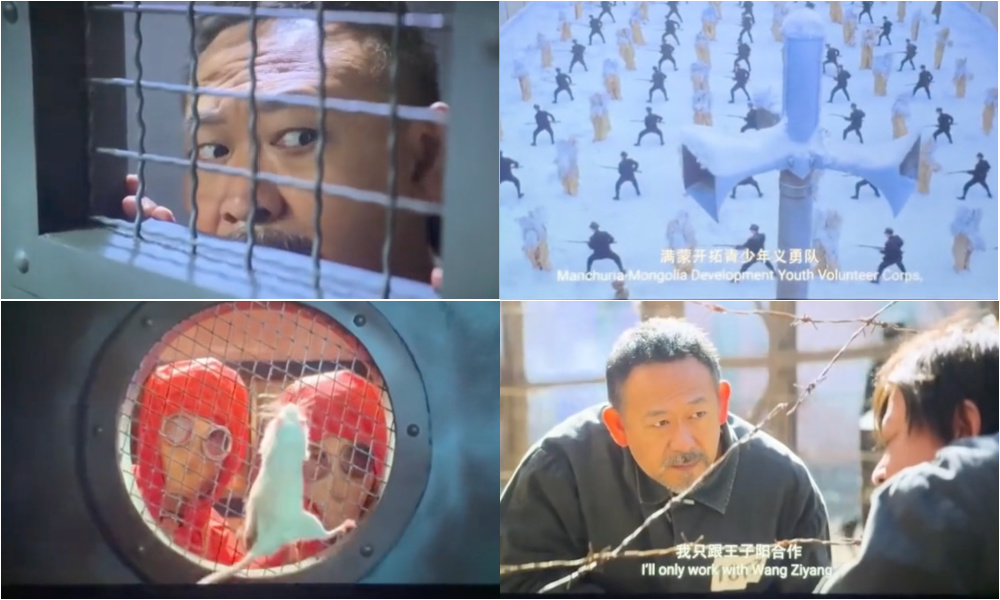
Scenes from 731.
Narrative elements also echo Squid Game’s deadly competitions, including an actual life-or-death rope pulling game. In 731, “winners” are promised freedom (but actually sent for experiments) and “losers” surviving slightly longer, until even these rules seemingly disappear, leaving viewers just as lost as the characters.
Beyond these echoes of Squid Game and The Shawshank Redemption (with their themes of prison break, brotherhood, and hope), where horror meets drama and occasionally even comedy, I also thought I saw traces of The Green Mile (there’s even a befriended mouse), The Shining, One Flew Over the Cuckoo’s Nest, and even Kill Bill.
If this all sounds like a fever dream, that’s about right.
While the film undoubtedly has artistic value in its visual references and symbolism, at times it seems more intent on presenting itself as an arthouse production than on telling a coherent historical war story.
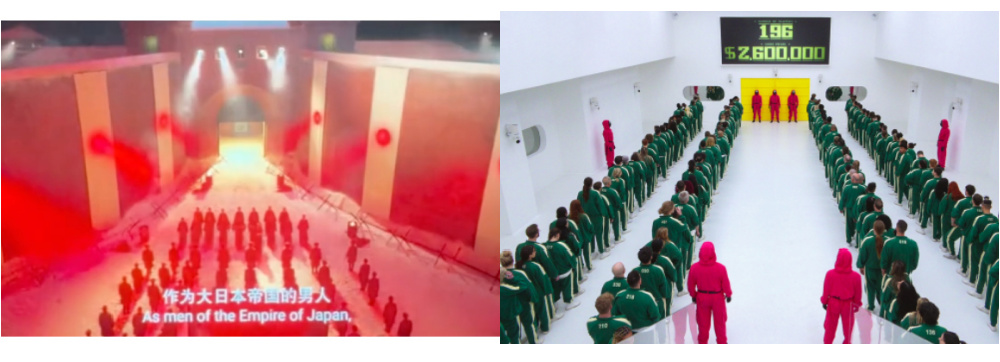
731 scene showing Japanese flags with red lasers/spotlights one the left. Some of the movie’s camera angle points, color use, narrative elements and settings show some similarities with Squid Game (image on right).
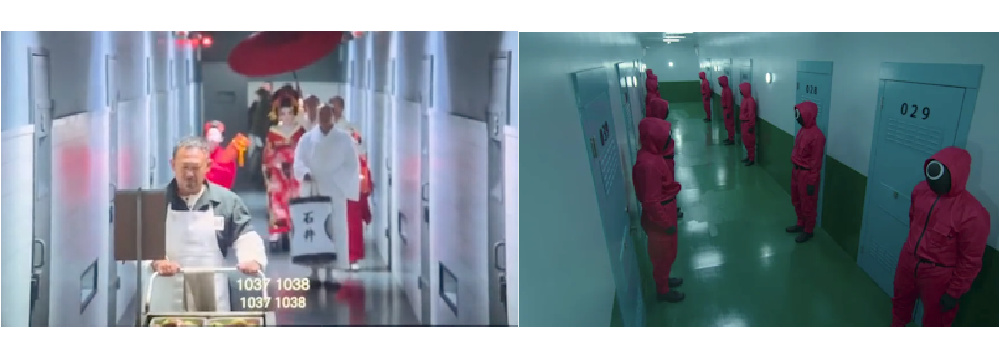
731 (left), Squid Game (right)
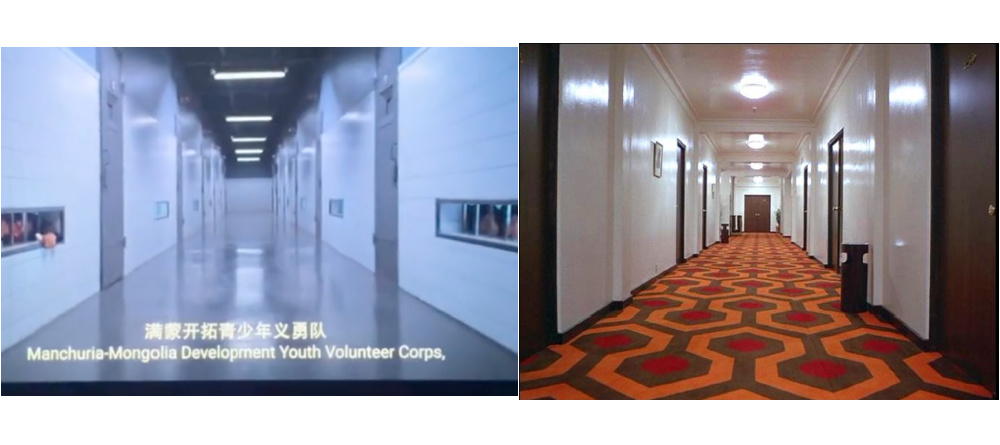
Scene from 731, which I thought sometimes had some echoes from The Shining.

Another reference to Stanley Kubrick? 731 on the left, Clockwork Orange on the right.
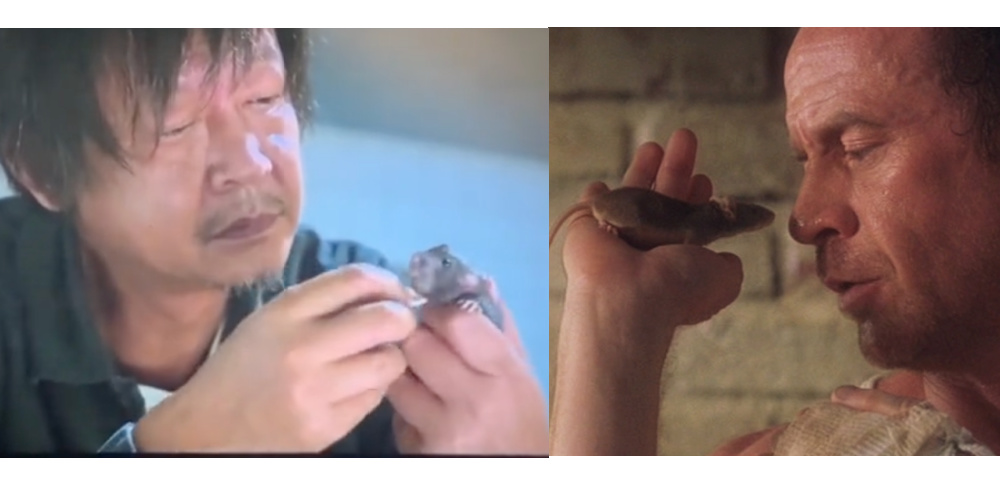
Prison mouse friend. 731 (left) and The Green Mile (right).
And that is also what most of the online critique is about – people feel that while the movie is supposed to be about creating awareness of a particularly horrific part of Chinese war history, the actual factual history seems to have ended up in the background.
One commenter from Harbin wrote:[5]
💬 “For Harbin, 731 is the most painful chapter of history. This movie uses a mass of absurd visuals and music to tell a story that has almost nothing to do with real history. All the information that truly should have been shown is brushed over in passing words, and in the end it just tells audiences ‘never forget history’? This tramples on the history of 731. Stupid and vulgar.”
Others are also upset over historical inaccuracies in the film — from the makeup to the sets, the props, and the biological experiments. Even the toilet paper used by the prisoners isn’t very realistic, with some commenters saying these kinds of details ‘drove them crazy’:
💬 “I’m born after 1990, and even I grew up with worse toilet paper than what the aggressors in those years apparently gave to their prisoners. Theirs was so high-quality you could fold it into bows and baby shoes. Must have been strong, durable, and waterproof.”[6]
One other reviewer on Douban wrote:
💬 “As a prison break film it’s not exciting, as a historical film it’s too careless, and as a drama it’s too fragmented.”[7]
Douban reviewer Qingyun (青云) noted that it jumps from relatively calm scenes to intense emotional outbursts or extreme cruelty without any buildup — instead of moving viewers to tears, it alienates them from the story and its characters.
He adds:
💬 “The film wants to exploit history’s seriousness to entertain the public, but also fears the theme is too depressing and will affect the box office, so it stuffs in commercial gimmicks (jokes, fantasy, spectacle). This opportunism sacrifices the solemnity that is rewired for the historical topic, while also failing to provide as qualified entertainment. The result: it offends history and disappoints audiences.”[8]
Most of these disappointed reviewers argued that the chance to tell the story of Unit 731 was wasted by a director and script that offered little context to the subject, with some even suggesting that another, 37-year-old film (Men Behind the Sun, 黑太阳731, 1988) did a better job of conveying the history of Japan’s biological warfare in China.
A ‘Masterful Cult Film,’ But a ‘Total Failure’ as a War Movie
Despite the wave of strongly negative feedback, there are also those who did find the film moving, giving it five-star reviews — some from those who stress the film’s value as a reminder to “never forget national humiliation,” while others genuinely appreciate its creative vision.
Douban commenter ‘Bat Lord’ (蝙蝠君) called it a “masterful cult film” with the film’s aesthetics being “built on a foundation of Western stereotypical Orientalism of Japan and layered with Christian martyrdom.”[9]
As an example, Bat Lord describes a recurring scene in which prisoners are taken from their cells toward “freedom,” only to be taken to lethal human experiments. They are escorted by Japanese guards in traditional kimonos with samurai swords, led by a geisha carrying a bright red umbrella and wearing impossibly high okobo clogs, followed by Edo-period guards with topknots and white kimono. Bat Lord calls it “Orientalist punk seen through a Western gaze” (“有一种西方视角的东方主义朋克的味道”).
The reviewer also interprets the main characters, the Chinese prisoners, as representations of Christian martyrdom. Cross symbols are indeed everywhere in the film, with prisoner No. 017 constantly drawing crosses on the wall, and an ingenious escape plan hidden in a dictionary as a series of crosses.
At the climax, after battling guards in kimonos with wooden swords, the prisoners flee toward a crematorium resembling a cathedral of light, where crosses formed from pure white beams symbolize freedom. But behind the cross loom the Japanese executioners. After a bloody massacre, the survivors are captured and executed — tied to crosses arranged around a pit, with fleas dropped on them from above as Japanese officers watch from a grandstand.
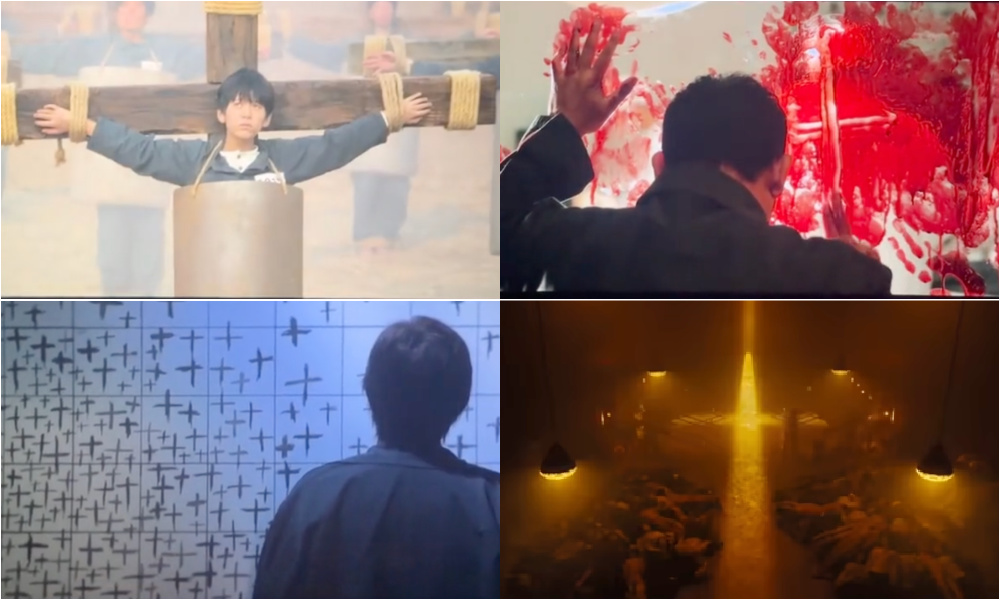
Cross symbols appear throughout the film.
💬 “It’s clearly a direct homage to Christian martyrs who were sacrificed in the Colosseum during the ancient Roman Empire. In the end, all the protagonists die martyrs’ deaths,” Bat Lord writes.[10]
He concludes that the film is “4/5 as an art house film, but zero points as a war movie”:
💬 “As a mainstream patriotic commercial blockbuster, it is a complete and utter failure (..) But as a niche cult prank film, it actually has some positive points (…) – built on exaggerated Orientalist visions of Japan, it feels strangely authentic. This kind of deconstruction of Japanese culture isn’t something the Japanese themselves could do — only the West or China, as seen in works like The Last Samurai, Ghost of Tsushima, and Shogun.” [11]
He adds:
💬 “The biggest problem is the subject matter. Using 731 — such a solemn, tragic history — only to hollow out its pain, exploit national emotions, and repackage it as a cult prank film disguised as a patriotic blockbuster, inevitably backfires. If it had been framed as a semi-fictional low-budget black comedy, the backlash wouldn’t be so severe.”[12]
“No Japanese in Heaven”: Over-‘Othering’ the Enemy
How could 731 have failed so miserably to live up to public expectations?
In recent years, Chinese museums, books, and popular culture have made many attempts to revitalize the history of war and make it more relevant to younger generations. In many cases, this has been successful, from popular war dramas to blockbuster films.
But Unit 731 is perhaps an especially difficult subject to adapt into a commercially successful film for a broad audience, especially since it chose to leave out the kind of contextualization that Oppenheimer provided in exploring the history, process, and character development that led to the atomic bomb.
Like the gas chambers of Auschwitz or Mengele’s brutal experiments, its history is so gruesome that there is little to focus on beyond the suffering of the victims and the cruelty of the perpetrators. (The film had already been postponed once, as it allegedly failed to pass official screenings due to its graphic scenes.)
War films in China are expected to reflect — or help shape — national identity. In 731, this means boosting national unity by focusing on Japan as the ultimate “Other,” the ‘constructed outsider’ against which the own national identity is defined.
The entire nation is cast as an enemy, depicted through exaggerated cultural symbols — geishas, kimonos, samurai, and cherry blossoms — regardless of whether they belonged in the actual prison setting. Japan’s national colors and imagery are fused with scenes of bloody and barbaric slaughter, turning Japanese cultural identity itself into a target.
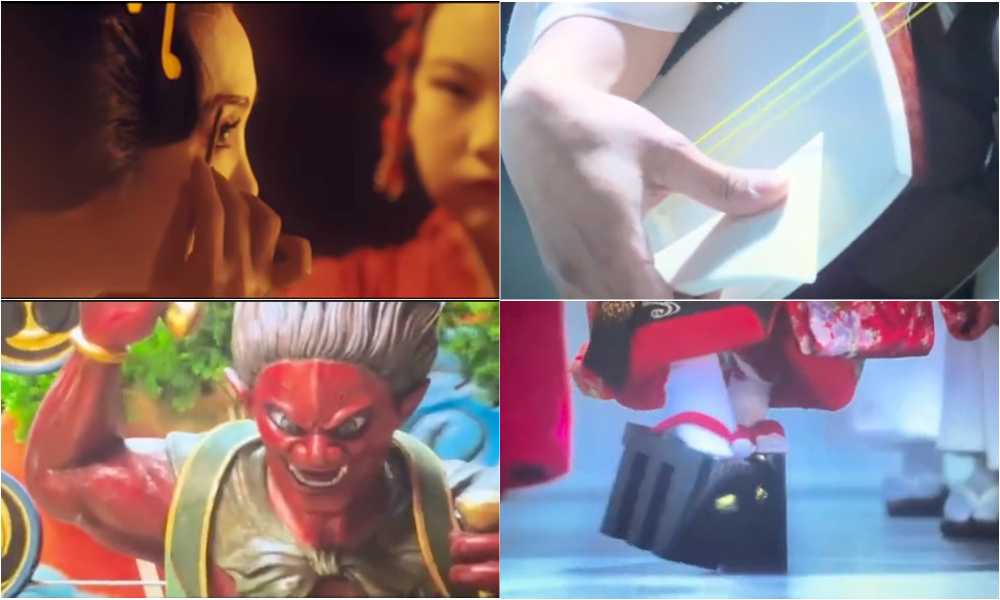
References to Japanese cultural symbols in the film.
In doing so, the film not only holds Japan as a whole responsible for its wartime aggression, but also strengthens Chinese identity by defining it in opposition to Japan, visually contrasting “good” versus “evil” through opposing characters, colors, and symbols.
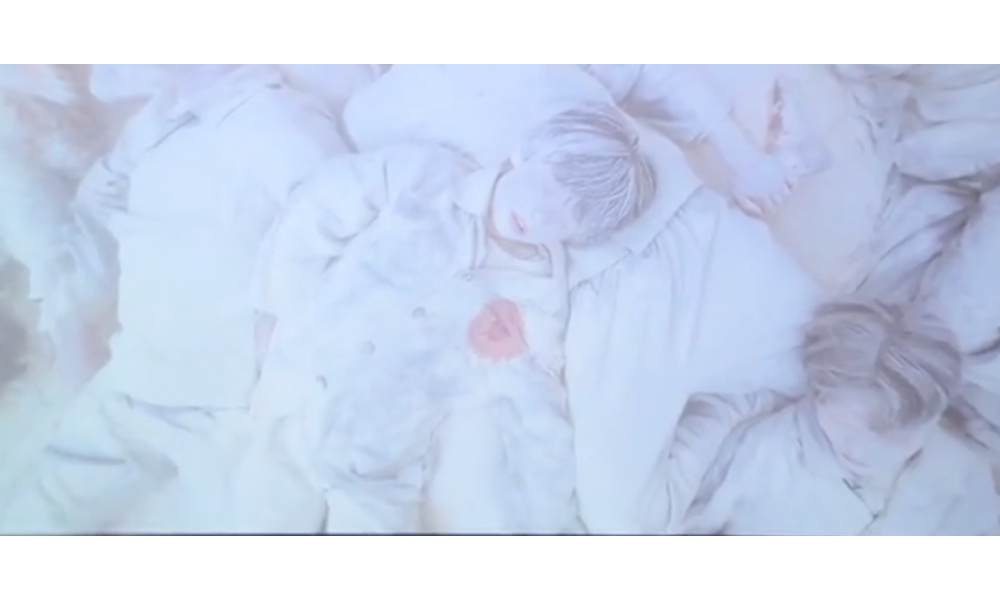
Clear visual symbols: dead Chinese bodies covered in white dust. With the red circle of blood, the scene resembles a Japanese flag.
This contrast is also made explicit in dialogue: at the beginning of the film, for instance, a young boy enters the stark white prison halls and asks, “Master, are we in heaven?” to which the older Chinese man replies, “Nonsense, how could there be Japanese in heaven?”
In promoting the film, director Zhao Linshan (赵林山) reinforced the image of Japan as the eternal “Other” by explaining that he had insisted none of the Japanese roles could have possibly played by Chinese actors, suggesting they would not be able to convey their evilness. Despite the difficulty of bringing over more than 80 Japanese actors during China’s ‘zero Covid’ era, when 731 was largely filmed, Zhao maintained that “only the Japanese can play this dual nature.”
While Chinese social media is often filled with anti-Japanese sentiment, many viewers criticized the depiction of “Japan” and the Unit 731 staff — not because of the anti-Japanese angle, but because they felt it trivialized history. They argued that Unit 731 was already so horrific that it needed no added gimmicks, tropes, or exaggerated villains to make it look bad.
As Douban reviewer Qingyun wrote:
💬 “Portraying devils as clowns diminishes their true guilt. The real criminals were rational, organized, and intelligent, embodying the will of Japanese militarism as a systematic project. Making them idiots (..) greatly underestimates the danger and organization of militarism, and is a severe simplification of history.”[13]
This critique goes further, suggesting the film both weakens its warning value (“the true terror is that advanced civilization and barbarism can coexist”) and cheapens the victims’ suffering (“if the enemy is so stupid, the tragedy seems less grave”).
On Weibo, one commenter criticized this one-sided approach:
💬 “I saw an auntie in Hangzhou who, after watching the movie 731, said she hated the Japanese devils so much — that she would hate them for her entire life. But this elderly woman, brainwashed by hatred education for a lifetime, doesn’t stop to think that (..) so many other brutal slaughters happened throughout Chinese history. If you only speak of hate, can your hate keep up with all of them? Shouldn’t we instead explore and reflect more deeply on the underlying causes of these events? Better to talk less of hate and more of love — because only the most genuine love from the depths of the human heart can ultimately prevent such tragedies from happening again.”[14]
Some viewers who appreciated the film, however, disagreed. One Weibo user wrote: “I watched the film with my husband and on our way home we scolded the Japanese, wishing we could throw two more atomic bombs on them. It was a good film.”
Between the history and the hate, the official narrative, the polarized audience reactions, and disagreements over the film’s message, 731 has brought more controversy than clarity.
But beyond the debate and confusion, one message remains clear. As one viewer wrote:
“The film wasn’t what I expected, but I’m not sure what I even expected? A good story? More like a documentary? There’s one thing I can say for sure: this movie is just a shell — the history itself is the soul.”[15]
By Manya Koetse
Spotted a mistake or want to add something? Please let us know in comments below or email us. First-time commenters, please be patient – we will have to manually approve your comment before it appears.
References
- “看完有种被诈骗的感觉” (source: Douban).
- “一句话评价《731》,导演按照《肖申克的救赎》拍出了《鱿鱼游戏》” (source: Xiaohongshu).
- “令人非常迷惑” (source: Douban).
- “短评骂的字数不够了实在是忍不了了” (source: Douban).
- “作为一个哈尔滨人,去过至少三次纪念馆,731对于哈尔滨就是最沉痛的一段历史,这个电影用大量极其荒诞的镜头和音乐,讲述一个基本跟真实历史毫无关系的故事,所有真正需要拍出来的信息全部是文字一笔带过,最后却告诉观众勿忘历史?这是对731这段历史的践踏。弱智且下流” (Source: comment section Sina).
- “作为一个90后,我出生的那个年代卫生纸质量都达不到侵略者给实验体使用的,纸的质量太好了,又是编蝴蝶结,又是编鞋子的,我猜应该是坚韧又耐用,透水都不断的那种吧” (Source: Douban long reviews).
- “或许是删减太多或许是各种局限,当做越狱不精彩,当做历史片太随意,当做剧情片太碎片”(Source: Douban).
- “影片既想利用沉重历史的严肃性作为宣传噱头,又担心题材过于压抑影响票房,于是强行注入商业娱乐元素(搞笑、幻想、刺激场面)。这种“既要…又要…”的投机心态导致影片既失去了历史题材必需的敬畏感,又未能提供合格的娱乐体验。最终,它既冒犯了历史,也辜负了观众”(Source Douban, review by Qingyun (青云).
- “西方刻板印象东方主义日本与基督殉难的碰撞,cult片的杰出之作”(Source: Douban, review by ‘Bat Lord’ (蝙蝠君).
- “很明显也在致敬古罗马帝国时期殉道在斗兽场的圣徒们。最终主角团全员殉道,无一幸免。”
- “这个片作为主流主旋律商业大片是完全的,彻头彻尾的失败,彷佛那纯纯的依托!甚至从预告片开始这电影就没有任何一丝一毫的符合历史,我从一开始就完全没有抱任何期望的去看,结果发现这片作为小众邪典整蛊片却颇有可取之处(。。)当你不认为这片是正常电影之后,这片表达出的那股子真的是超正宗的外国视角下的刻板印象东方主义日本美学、东方朋克味,这种对日本文化的魔怔向的解构其实我个人还真感觉挺不错的。这种解构日本人是搞不出来的,目前只有欧美和中国能搞出来,代表作就是《最后的武士》、《对马岛》、《幕府将军》之类的作品,里面的日本文化,日本武士道精神一个赛一个魔怔,欧美是往骑士幻想的那个路子去走的,我们是往黑暗邪典的路子去走的“
- “所以这片的最大问题还是选择了731这个严肃题材,完全在消解历史的悲痛,消费民族的情感,拍了个小众邪典整蛊片后,还按照主流商业片来包装和宣发,如果他拍成半架空的超小成本黑色喜剧我觉得反噬恐怕不会有这么大”(Source: Douban).
- “它美化了真正的邪恶:将恶魔塑造成小丑,实际上减轻了他们的罪责。真实的731部队不是一群疯癫的傻瓜,而是清醒的、有组织的、高智商的罪犯。他们的行为是日本军国主义国家意志的体现,是一个系统性的工程。把他们拍得弱智,仿佛这场悲剧只是一群笨蛋造成的意外,这极大地低估了军国主义的危害性和组织性,是对历史的严重简化”(source: Douban).
- “看到一位杭州阿姨看完电影731后讲太恨日本鬼子了,要一辈子一辈子的恨。这个被仇恨教育洗脑一辈子的老太太,您也不思考一下,嘉定三屠,江东六十四屯,南京大屠杀等等一系列的野蛮屠杀事件在中国历史上发生的太多了,光讲恨您恨的过来吗?不应该是更多的探究和反省发生这些事的深层原因嘛!还是少谈恨多讲爱吧,只有发自心底人类最真实的爱才能最后解决这些惨案在人类世界的发生吧”(Source: Weibo).
- Weibo user “红屋顶上的猫”: “我不知道该怎么评。首先在这个忙乱的日子里安排自己去看这个电影,我也说不清楚我是想铭记那段历史,还是想比较小时候看过的《荒原城堡731》,还有那部《黑太阳》。其次我也不知道电影从越狱视角切入,写实和魔幻风格交替,是好还是不好?但它和我想象的不一样,可我也不知道自己想看到的到底是什么样?甚至我也说不清我对这场电影的期待是什么?讲好故事?还是拍成纪录片?我只能确定,电影只是个壳子,那段历史才是灵魂。”
©2025 Whatsonweibo. All rights reserved. Do not reproduce our content without permission – you can contact us at info@whatsonweibo.com.
Subscribe
What’s on Weibo is a reader-supported publication, run by Manya Koetse (@manyapan), offering independent analysis of social trends in China for over a decade. To receive new posts and support our work, consider becoming a paid subscriber.

Get in touch
Would you like to become a contributor, or do you have any tips or suggestions? Get in touch here!

From Tents to ‘Tangping Travel”: New Travel Trends among Young Chinese

House of Wahaha: Zong Fuli Resigns

How the “Nexperia Incident” Became a Mirror of China–Europe Tensions

China Faces Unprecedented Donkey Shortage Crisis

Nanchang Crowd Confuses Fan for Knife — Man Kicked Down and Taken Away

“Jiangyou Bullying Incident”: From Online Outrage to Offline Protest

The Rising Online Movement for Smoke-Free Public Spaces in China

China Trend Watch: Pagoda Fruit Backlash, Tiananmen Parade Drill & Alipay Outage (Aug 11–12)

From Schadenfreude to Sympathy: Chinese Online Reactions to Charlie Kirk Shooting

Passing the Torch from ‘Ne Zha’ to ‘Nobody’: China’s Box Office Poster Relay Tradition
Popular Reads
-

 China Memes & Viral3 months ago
China Memes & Viral3 months agoHidden Cameras and Taboo Topics: The Many Layers of the “Nanjing Sister Hong” Scandal
-

 China Books & Literature12 months ago
China Books & Literature12 months agoThe Price of Writing Smut: Inside China’s Crackdown on Erotic Fiction
-

 China Insight5 months ago
China Insight5 months agoUnderstanding the Dr. Xiao Medical Scandal
-

 China Memes & Viral10 months ago
China Memes & Viral10 months agoOur Picks: Top 10 Chinese Buzzwords and Phrases of 2024 Explained



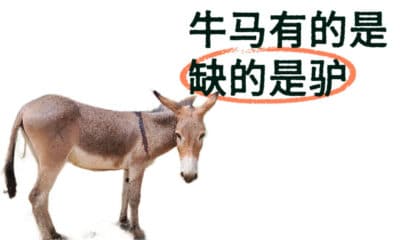
Raine
September 15, 2021 at 12:09 pm
I get drugs, abuse, fraud, tax evasion, abandoning your babies, etc, etc, but BEING A TOURIST IN JAPAN???
WTH??? That’s more of an indictment on China than Zhang Zhehan. <3 <3 <3 Totally gutted for him and his fans. 🙁
I can't read who most of his brand/sponsors were but for sure, Coca Cola, Nivea and Clinique are off my shopping list forever.